EU Policy Impact on UK Businesses
VerifiedAdded on 2020/01/28
|18
|5453
|49
Essay
AI Summary
This assignment explores the impact of European Union policies on UK businesses. It examines the Common Agricultural Policy (CAP) and its benefits for organizations like Nestle, the EU's role in protecting intellectual property rights, the influence of European climate change initiatives, and the regional policy aimed at supporting businesses post-Brexit. The assignment also touches upon global factors influencing business operations and the interplay of demand and supply in the market.
Contribute Materials
Your contribution can guide someone’s learning journey. Share your
documents today.
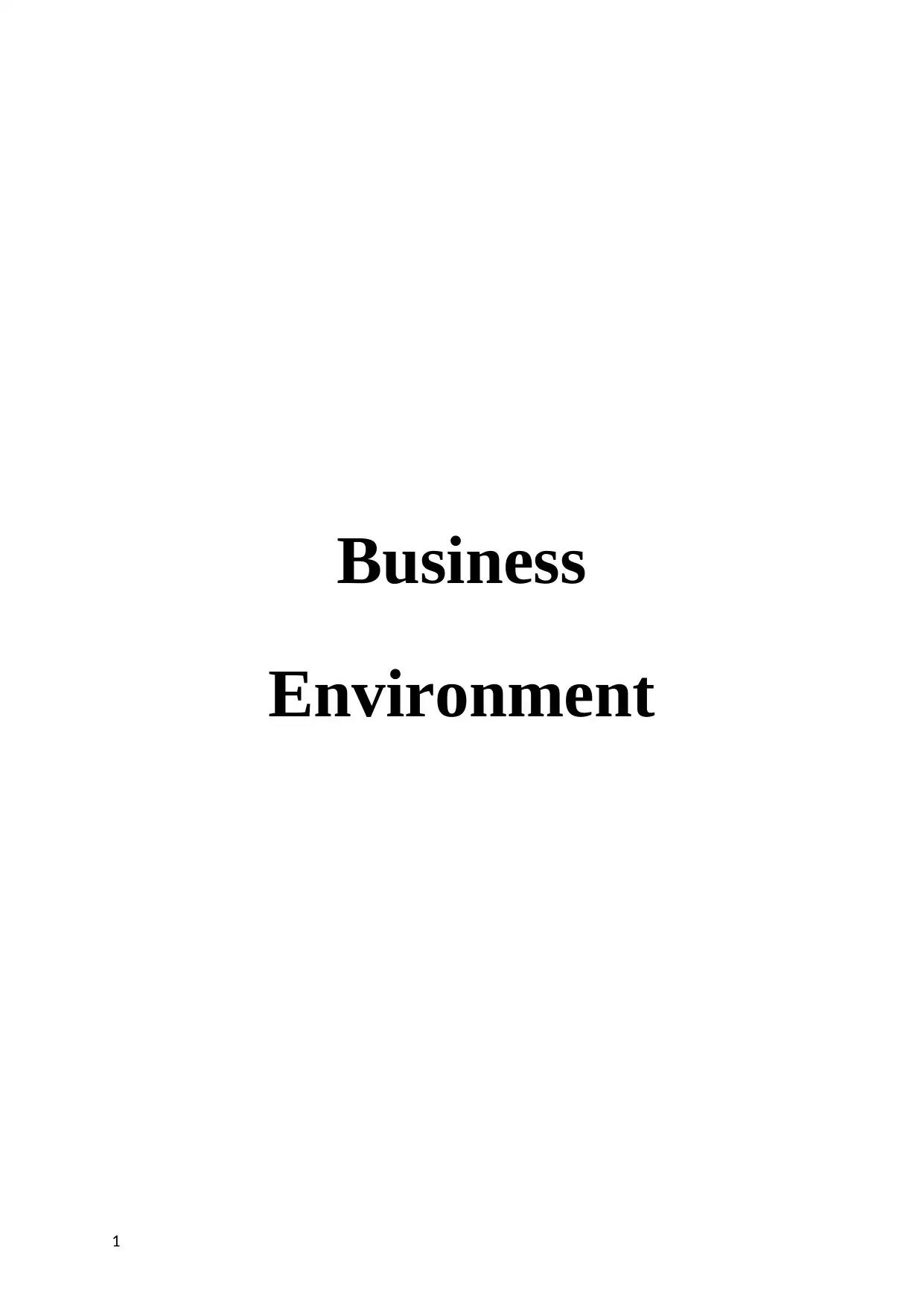
Business
Environment
1
Environment
1
Secure Best Marks with AI Grader
Need help grading? Try our AI Grader for instant feedback on your assignments.
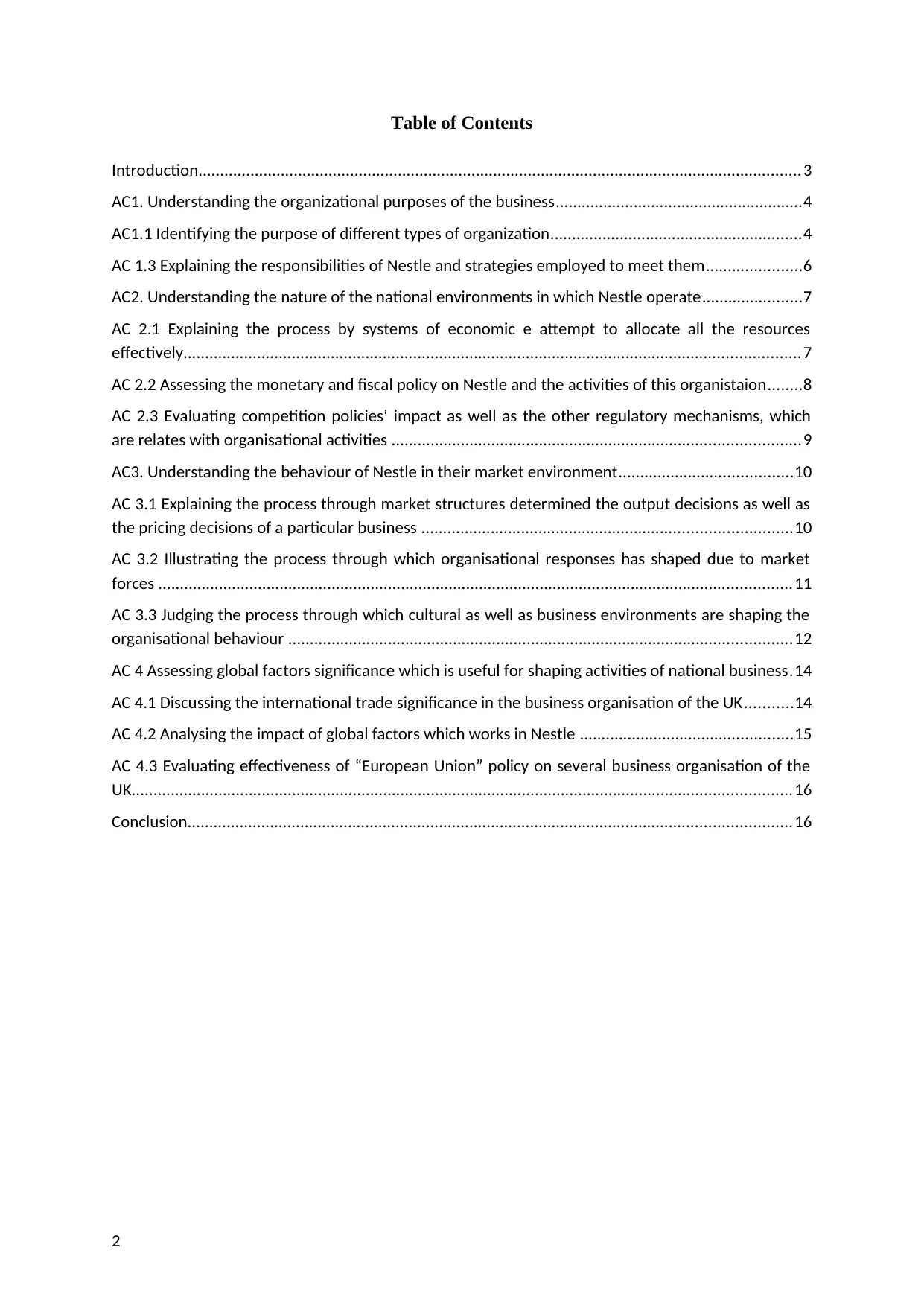
Table of Contents
Introduction...........................................................................................................................................3
AC1. Understanding the organizational purposes of the business.........................................................4
AC1.1 Identifying the purpose of different types of organization..........................................................4
AC 1.3 Explaining the responsibilities of Nestle and strategies employed to meet them......................6
AC2. Understanding the nature of the national environments in which Nestle operate.......................7
AC 2.1 Explaining the process by systems of economic e attempt to allocate all the resources
effectively..............................................................................................................................................7
AC 2.2 Assessing the monetary and fiscal policy on Nestle and the activities of this organistaion........8
AC 2.3 Evaluating competition policies’ impact as well as the other regulatory mechanisms, which
are relates with organisational activities ..............................................................................................9
AC3. Understanding the behaviour of Nestle in their market environment........................................10
AC 3.1 Explaining the process through market structures determined the output decisions as well as
the pricing decisions of a particular business .....................................................................................10
AC 3.2 Illustrating the process through which organisational responses has shaped due to market
forces ..................................................................................................................................................11
AC 3.3 Judging the process through which cultural as well as business environments are shaping the
organisational behaviour ....................................................................................................................12
AC 4 Assessing global factors significance which is useful for shaping activities of national business.14
AC 4.1 Discussing the international trade significance in the business organisation of the UK...........14
AC 4.2 Analysing the impact of global factors which works in Nestle .................................................15
AC 4.3 Evaluating effectiveness of “European Union” policy on several business organisation of the
UK........................................................................................................................................................16
Conclusion...........................................................................................................................................16
2
Introduction...........................................................................................................................................3
AC1. Understanding the organizational purposes of the business.........................................................4
AC1.1 Identifying the purpose of different types of organization..........................................................4
AC 1.3 Explaining the responsibilities of Nestle and strategies employed to meet them......................6
AC2. Understanding the nature of the national environments in which Nestle operate.......................7
AC 2.1 Explaining the process by systems of economic e attempt to allocate all the resources
effectively..............................................................................................................................................7
AC 2.2 Assessing the monetary and fiscal policy on Nestle and the activities of this organistaion........8
AC 2.3 Evaluating competition policies’ impact as well as the other regulatory mechanisms, which
are relates with organisational activities ..............................................................................................9
AC3. Understanding the behaviour of Nestle in their market environment........................................10
AC 3.1 Explaining the process through market structures determined the output decisions as well as
the pricing decisions of a particular business .....................................................................................10
AC 3.2 Illustrating the process through which organisational responses has shaped due to market
forces ..................................................................................................................................................11
AC 3.3 Judging the process through which cultural as well as business environments are shaping the
organisational behaviour ....................................................................................................................12
AC 4 Assessing global factors significance which is useful for shaping activities of national business.14
AC 4.1 Discussing the international trade significance in the business organisation of the UK...........14
AC 4.2 Analysing the impact of global factors which works in Nestle .................................................15
AC 4.3 Evaluating effectiveness of “European Union” policy on several business organisation of the
UK........................................................................................................................................................16
Conclusion...........................................................................................................................................16
2
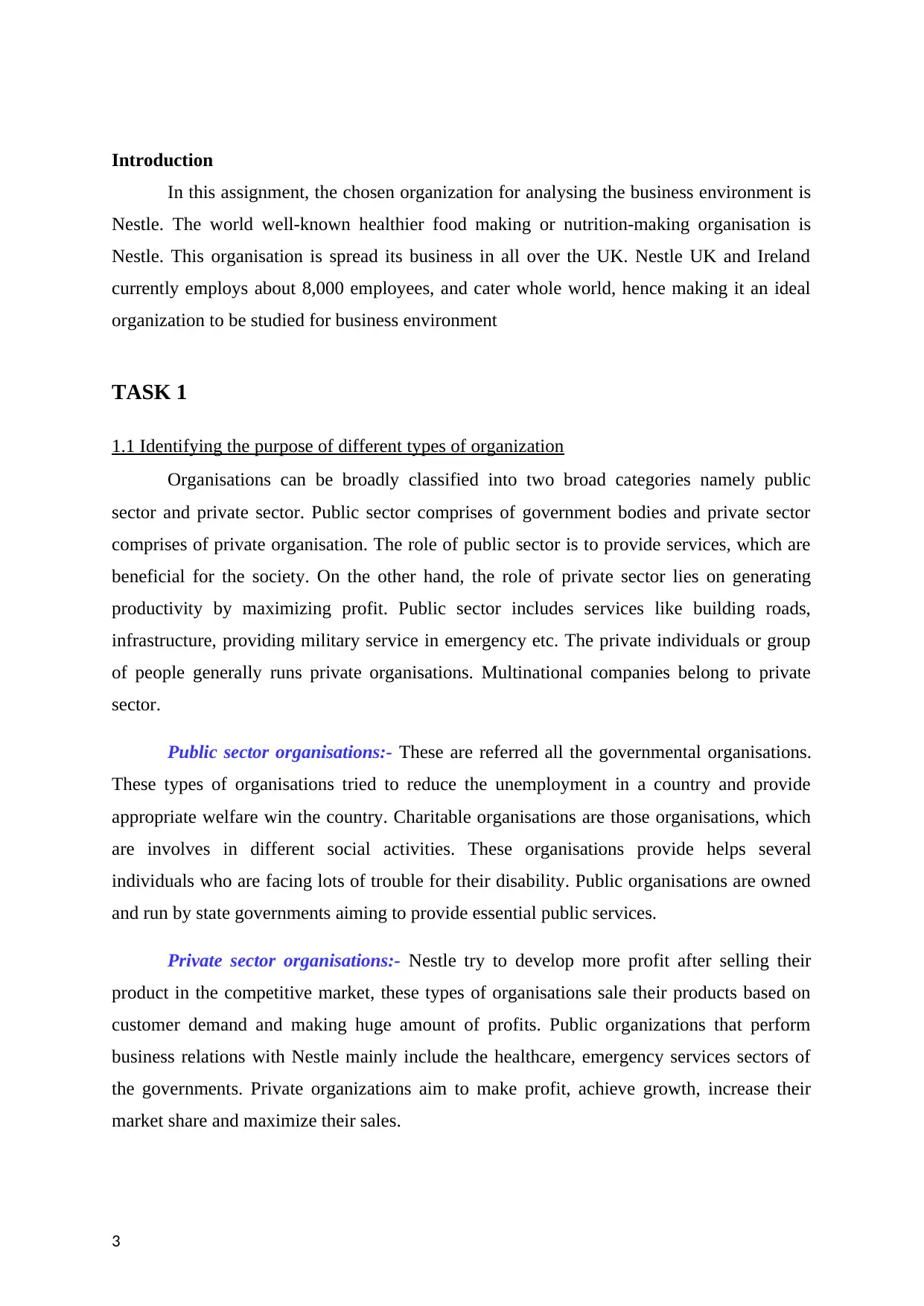
Introduction
In this assignment, the chosen organization for analysing the business environment is
Nestle. The world well-known healthier food making or nutrition-making organisation is
Nestle. This organisation is spread its business in all over the UK. Nestle UK and Ireland
currently employs about 8,000 employees, and cater whole world, hence making it an ideal
organization to be studied for business environment
TASK 1
1.1 Identifying the purpose of different types of organization
Organisations can be broadly classified into two broad categories namely public
sector and private sector. Public sector comprises of government bodies and private sector
comprises of private organisation. The role of public sector is to provide services, which are
beneficial for the society. On the other hand, the role of private sector lies on generating
productivity by maximizing profit. Public sector includes services like building roads,
infrastructure, providing military service in emergency etc. The private individuals or group
of people generally runs private organisations. Multinational companies belong to private
sector.
Public sector organisations:- These are referred all the governmental organisations.
These types of organisations tried to reduce the unemployment in a country and provide
appropriate welfare win the country. Charitable organisations are those organisations, which
are involves in different social activities. These organisations provide helps several
individuals who are facing lots of trouble for their disability. Public organisations are owned
and run by state governments aiming to provide essential public services.
Private sector organisations:- Nestle try to develop more profit after selling their
product in the competitive market, these types of organisations sale their products based on
customer demand and making huge amount of profits. Public organizations that perform
business relations with Nestle mainly include the healthcare, emergency services sectors of
the governments. Private organizations aim to make profit, achieve growth, increase their
market share and maximize their sales.
3
In this assignment, the chosen organization for analysing the business environment is
Nestle. The world well-known healthier food making or nutrition-making organisation is
Nestle. This organisation is spread its business in all over the UK. Nestle UK and Ireland
currently employs about 8,000 employees, and cater whole world, hence making it an ideal
organization to be studied for business environment
TASK 1
1.1 Identifying the purpose of different types of organization
Organisations can be broadly classified into two broad categories namely public
sector and private sector. Public sector comprises of government bodies and private sector
comprises of private organisation. The role of public sector is to provide services, which are
beneficial for the society. On the other hand, the role of private sector lies on generating
productivity by maximizing profit. Public sector includes services like building roads,
infrastructure, providing military service in emergency etc. The private individuals or group
of people generally runs private organisations. Multinational companies belong to private
sector.
Public sector organisations:- These are referred all the governmental organisations.
These types of organisations tried to reduce the unemployment in a country and provide
appropriate welfare win the country. Charitable organisations are those organisations, which
are involves in different social activities. These organisations provide helps several
individuals who are facing lots of trouble for their disability. Public organisations are owned
and run by state governments aiming to provide essential public services.
Private sector organisations:- Nestle try to develop more profit after selling their
product in the competitive market, these types of organisations sale their products based on
customer demand and making huge amount of profits. Public organizations that perform
business relations with Nestle mainly include the healthcare, emergency services sectors of
the governments. Private organizations aim to make profit, achieve growth, increase their
market share and maximize their sales.
3
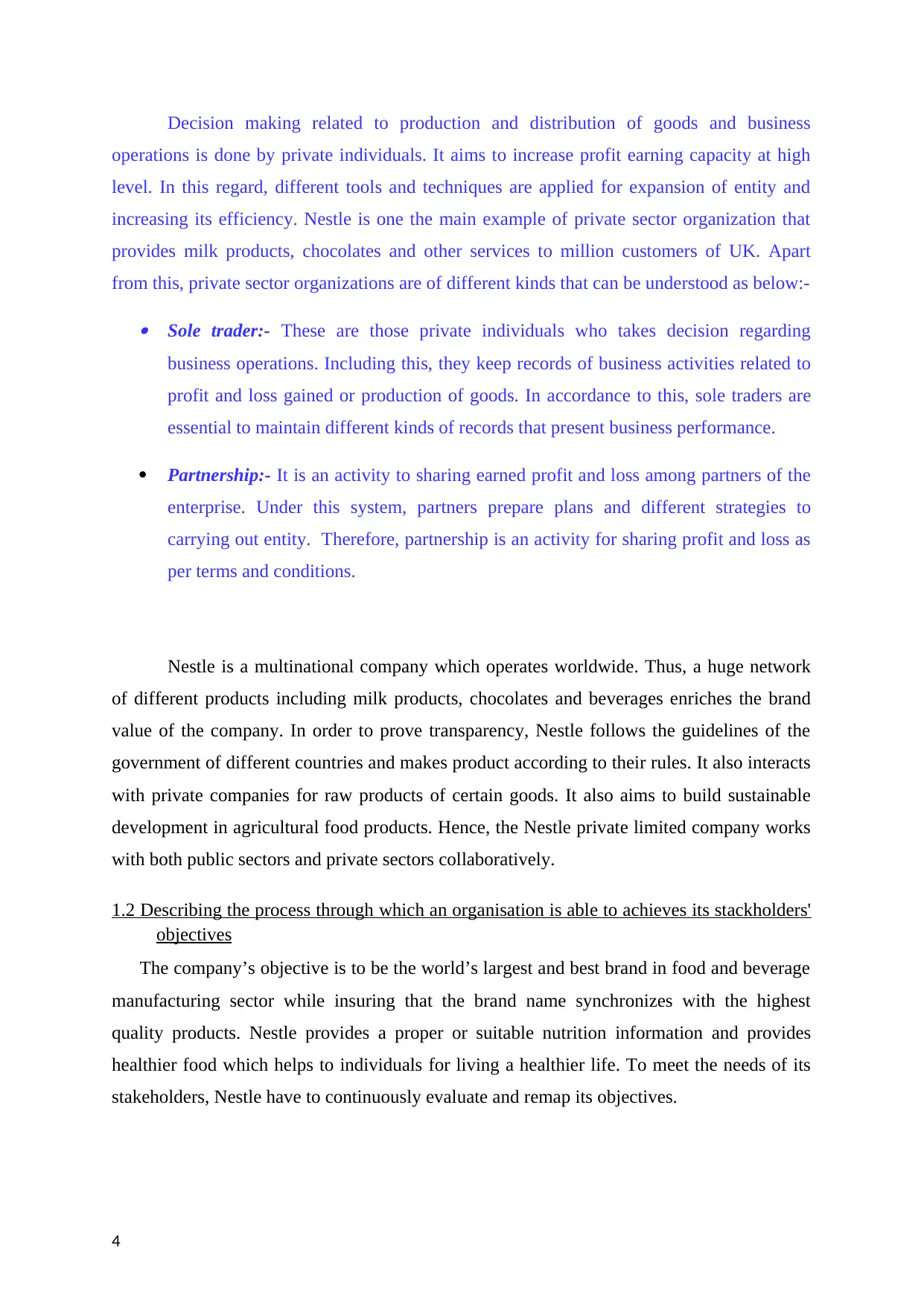
Decision making related to production and distribution of goods and business
operations is done by private individuals. It aims to increase profit earning capacity at high
level. In this regard, different tools and techniques are applied for expansion of entity and
increasing its efficiency. Nestle is one the main example of private sector organization that
provides milk products, chocolates and other services to million customers of UK. Apart
from this, private sector organizations are of different kinds that can be understood as below:-
Sole trader:- These are those private individuals who takes decision regarding
business operations. Including this, they keep records of business activities related to
profit and loss gained or production of goods. In accordance to this, sole traders are
essential to maintain different kinds of records that present business performance.
Partnership:- It is an activity to sharing earned profit and loss among partners of the
enterprise. Under this system, partners prepare plans and different strategies to
carrying out entity. Therefore, partnership is an activity for sharing profit and loss as
per terms and conditions.
Nestle is a multinational company which operates worldwide. Thus, a huge network
of different products including milk products, chocolates and beverages enriches the brand
value of the company. In order to prove transparency, Nestle follows the guidelines of the
government of different countries and makes product according to their rules. It also interacts
with private companies for raw products of certain goods. It also aims to build sustainable
development in agricultural food products. Hence, the Nestle private limited company works
with both public sectors and private sectors collaboratively.
1.2 Describing the process through which an organisation is able to achieves its stackholders'
objectives
The company’s objective is to be the world’s largest and best brand in food and beverage
manufacturing sector while insuring that the brand name synchronizes with the highest
quality products. Nestle provides a proper or suitable nutrition information and provides
healthier food which helps to individuals for living a healthier life. To meet the needs of its
stakeholders, Nestle have to continuously evaluate and remap its objectives.
4
operations is done by private individuals. It aims to increase profit earning capacity at high
level. In this regard, different tools and techniques are applied for expansion of entity and
increasing its efficiency. Nestle is one the main example of private sector organization that
provides milk products, chocolates and other services to million customers of UK. Apart
from this, private sector organizations are of different kinds that can be understood as below:-
Sole trader:- These are those private individuals who takes decision regarding
business operations. Including this, they keep records of business activities related to
profit and loss gained or production of goods. In accordance to this, sole traders are
essential to maintain different kinds of records that present business performance.
Partnership:- It is an activity to sharing earned profit and loss among partners of the
enterprise. Under this system, partners prepare plans and different strategies to
carrying out entity. Therefore, partnership is an activity for sharing profit and loss as
per terms and conditions.
Nestle is a multinational company which operates worldwide. Thus, a huge network
of different products including milk products, chocolates and beverages enriches the brand
value of the company. In order to prove transparency, Nestle follows the guidelines of the
government of different countries and makes product according to their rules. It also interacts
with private companies for raw products of certain goods. It also aims to build sustainable
development in agricultural food products. Hence, the Nestle private limited company works
with both public sectors and private sectors collaboratively.
1.2 Describing the process through which an organisation is able to achieves its stackholders'
objectives
The company’s objective is to be the world’s largest and best brand in food and beverage
manufacturing sector while insuring that the brand name synchronizes with the highest
quality products. Nestle provides a proper or suitable nutrition information and provides
healthier food which helps to individuals for living a healthier life. To meet the needs of its
stakeholders, Nestle have to continuously evaluate and remap its objectives.
4
Secure Best Marks with AI Grader
Need help grading? Try our AI Grader for instant feedback on your assignments.
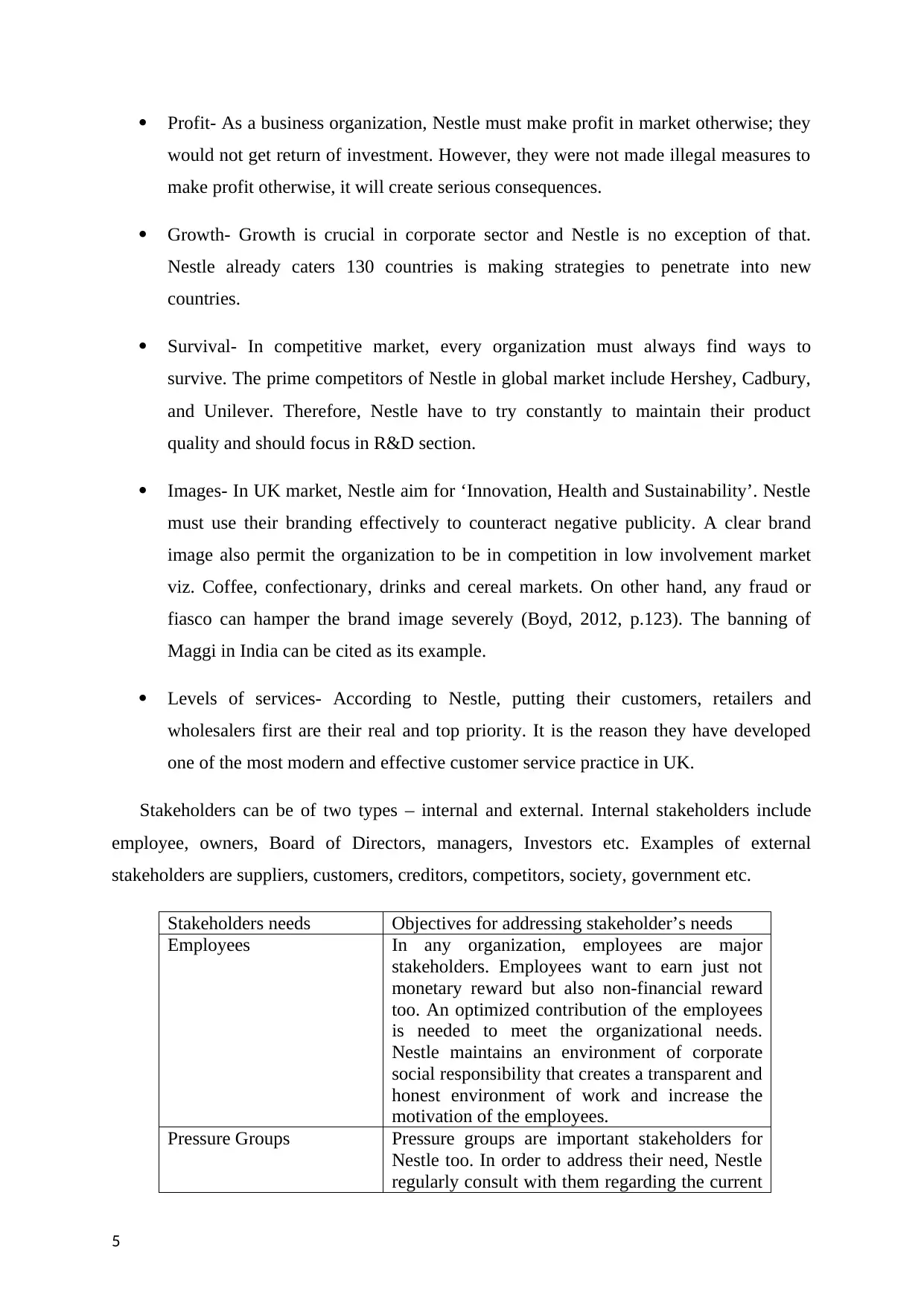
Profit- As a business organization, Nestle must make profit in market otherwise; they
would not get return of investment. However, they were not made illegal measures to
make profit otherwise, it will create serious consequences.
Growth- Growth is crucial in corporate sector and Nestle is no exception of that.
Nestle already caters 130 countries is making strategies to penetrate into new
countries.
Survival- In competitive market, every organization must always find ways to
survive. The prime competitors of Nestle in global market include Hershey, Cadbury,
and Unilever. Therefore, Nestle have to try constantly to maintain their product
quality and should focus in R&D section.
Images- In UK market, Nestle aim for ‘Innovation, Health and Sustainability’. Nestle
must use their branding effectively to counteract negative publicity. A clear brand
image also permit the organization to be in competition in low involvement market
viz. Coffee, confectionary, drinks and cereal markets. On other hand, any fraud or
fiasco can hamper the brand image severely (Boyd, 2012, p.123). The banning of
Maggi in India can be cited as its example.
Levels of services- According to Nestle, putting their customers, retailers and
wholesalers first are their real and top priority. It is the reason they have developed
one of the most modern and effective customer service practice in UK.
Stakeholders can be of two types – internal and external. Internal stakeholders include
employee, owners, Board of Directors, managers, Investors etc. Examples of external
stakeholders are suppliers, customers, creditors, competitors, society, government etc.
Stakeholders needs Objectives for addressing stakeholder’s needs
Employees In any organization, employees are major
stakeholders. Employees want to earn just not
monetary reward but also non-financial reward
too. An optimized contribution of the employees
is needed to meet the organizational needs.
Nestle maintains an environment of corporate
social responsibility that creates a transparent and
honest environment of work and increase the
motivation of the employees.
Pressure Groups Pressure groups are important stakeholders for
Nestle too. In order to address their need, Nestle
regularly consult with them regarding the current
5
would not get return of investment. However, they were not made illegal measures to
make profit otherwise, it will create serious consequences.
Growth- Growth is crucial in corporate sector and Nestle is no exception of that.
Nestle already caters 130 countries is making strategies to penetrate into new
countries.
Survival- In competitive market, every organization must always find ways to
survive. The prime competitors of Nestle in global market include Hershey, Cadbury,
and Unilever. Therefore, Nestle have to try constantly to maintain their product
quality and should focus in R&D section.
Images- In UK market, Nestle aim for ‘Innovation, Health and Sustainability’. Nestle
must use their branding effectively to counteract negative publicity. A clear brand
image also permit the organization to be in competition in low involvement market
viz. Coffee, confectionary, drinks and cereal markets. On other hand, any fraud or
fiasco can hamper the brand image severely (Boyd, 2012, p.123). The banning of
Maggi in India can be cited as its example.
Levels of services- According to Nestle, putting their customers, retailers and
wholesalers first are their real and top priority. It is the reason they have developed
one of the most modern and effective customer service practice in UK.
Stakeholders can be of two types – internal and external. Internal stakeholders include
employee, owners, Board of Directors, managers, Investors etc. Examples of external
stakeholders are suppliers, customers, creditors, competitors, society, government etc.
Stakeholders needs Objectives for addressing stakeholder’s needs
Employees In any organization, employees are major
stakeholders. Employees want to earn just not
monetary reward but also non-financial reward
too. An optimized contribution of the employees
is needed to meet the organizational needs.
Nestle maintains an environment of corporate
social responsibility that creates a transparent and
honest environment of work and increase the
motivation of the employees.
Pressure Groups Pressure groups are important stakeholders for
Nestle too. In order to address their need, Nestle
regularly consult with them regarding the current
5
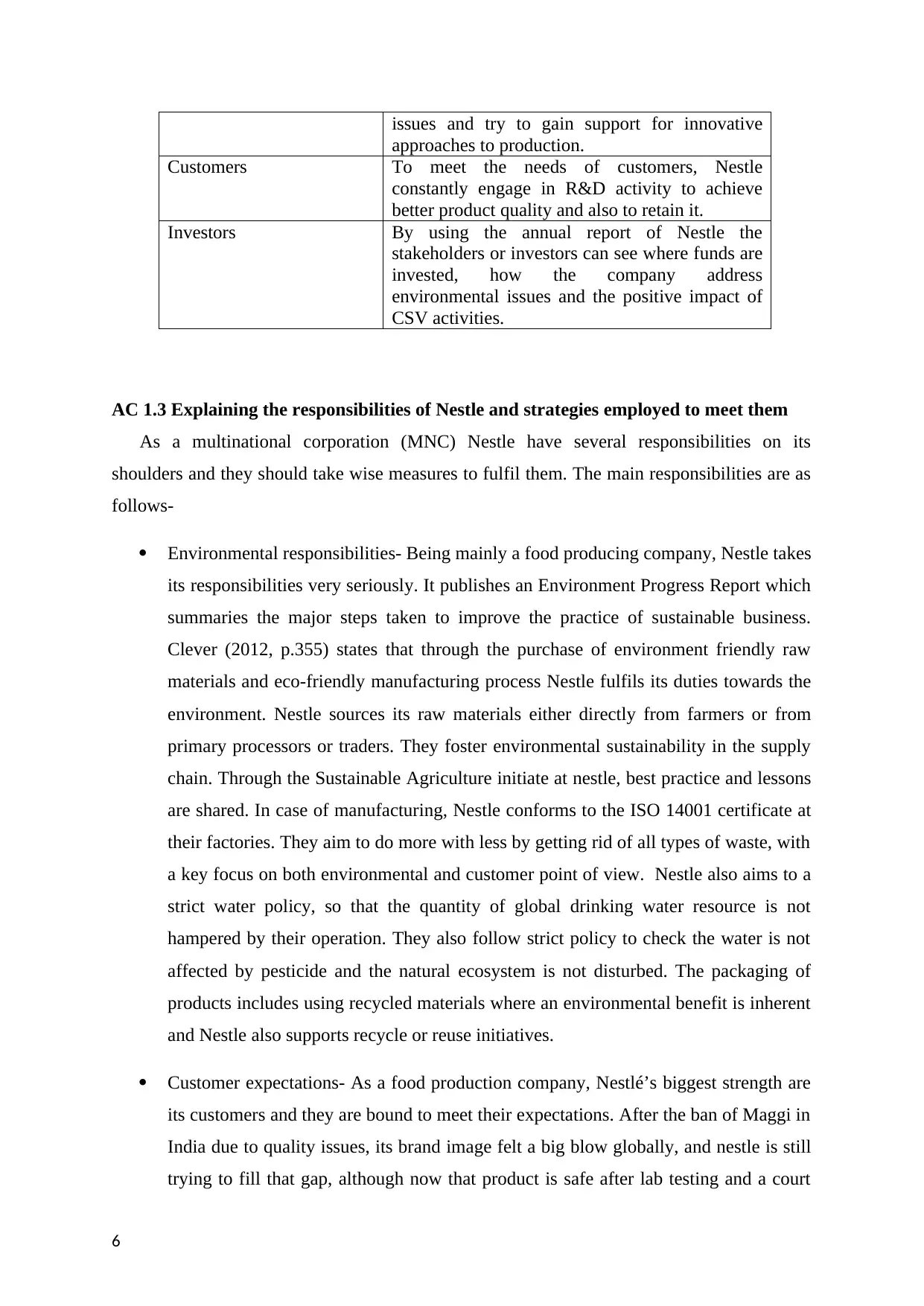
issues and try to gain support for innovative
approaches to production.
Customers To meet the needs of customers, Nestle
constantly engage in R&D activity to achieve
better product quality and also to retain it.
Investors By using the annual report of Nestle the
stakeholders or investors can see where funds are
invested, how the company address
environmental issues and the positive impact of
CSV activities.
AC 1.3 Explaining the responsibilities of Nestle and strategies employed to meet them
As a multinational corporation (MNC) Nestle have several responsibilities on its
shoulders and they should take wise measures to fulfil them. The main responsibilities are as
follows-
Environmental responsibilities- Being mainly a food producing company, Nestle takes
its responsibilities very seriously. It publishes an Environment Progress Report which
summaries the major steps taken to improve the practice of sustainable business.
Clever (2012, p.355) states that through the purchase of environment friendly raw
materials and eco-friendly manufacturing process Nestle fulfils its duties towards the
environment. Nestle sources its raw materials either directly from farmers or from
primary processors or traders. They foster environmental sustainability in the supply
chain. Through the Sustainable Agriculture initiate at nestle, best practice and lessons
are shared. In case of manufacturing, Nestle conforms to the ISO 14001 certificate at
their factories. They aim to do more with less by getting rid of all types of waste, with
a key focus on both environmental and customer point of view. Nestle also aims to a
strict water policy, so that the quantity of global drinking water resource is not
hampered by their operation. They also follow strict policy to check the water is not
affected by pesticide and the natural ecosystem is not disturbed. The packaging of
products includes using recycled materials where an environmental benefit is inherent
and Nestle also supports recycle or reuse initiatives.
Customer expectations- As a food production company, Nestlé’s biggest strength are
its customers and they are bound to meet their expectations. After the ban of Maggi in
India due to quality issues, its brand image felt a big blow globally, and nestle is still
trying to fill that gap, although now that product is safe after lab testing and a court
6
approaches to production.
Customers To meet the needs of customers, Nestle
constantly engage in R&D activity to achieve
better product quality and also to retain it.
Investors By using the annual report of Nestle the
stakeholders or investors can see where funds are
invested, how the company address
environmental issues and the positive impact of
CSV activities.
AC 1.3 Explaining the responsibilities of Nestle and strategies employed to meet them
As a multinational corporation (MNC) Nestle have several responsibilities on its
shoulders and they should take wise measures to fulfil them. The main responsibilities are as
follows-
Environmental responsibilities- Being mainly a food producing company, Nestle takes
its responsibilities very seriously. It publishes an Environment Progress Report which
summaries the major steps taken to improve the practice of sustainable business.
Clever (2012, p.355) states that through the purchase of environment friendly raw
materials and eco-friendly manufacturing process Nestle fulfils its duties towards the
environment. Nestle sources its raw materials either directly from farmers or from
primary processors or traders. They foster environmental sustainability in the supply
chain. Through the Sustainable Agriculture initiate at nestle, best practice and lessons
are shared. In case of manufacturing, Nestle conforms to the ISO 14001 certificate at
their factories. They aim to do more with less by getting rid of all types of waste, with
a key focus on both environmental and customer point of view. Nestle also aims to a
strict water policy, so that the quantity of global drinking water resource is not
hampered by their operation. They also follow strict policy to check the water is not
affected by pesticide and the natural ecosystem is not disturbed. The packaging of
products includes using recycled materials where an environmental benefit is inherent
and Nestle also supports recycle or reuse initiatives.
Customer expectations- As a food production company, Nestlé’s biggest strength are
its customers and they are bound to meet their expectations. After the ban of Maggi in
India due to quality issues, its brand image felt a big blow globally, and nestle is still
trying to fill that gap, although now that product is safe after lab testing and a court
6
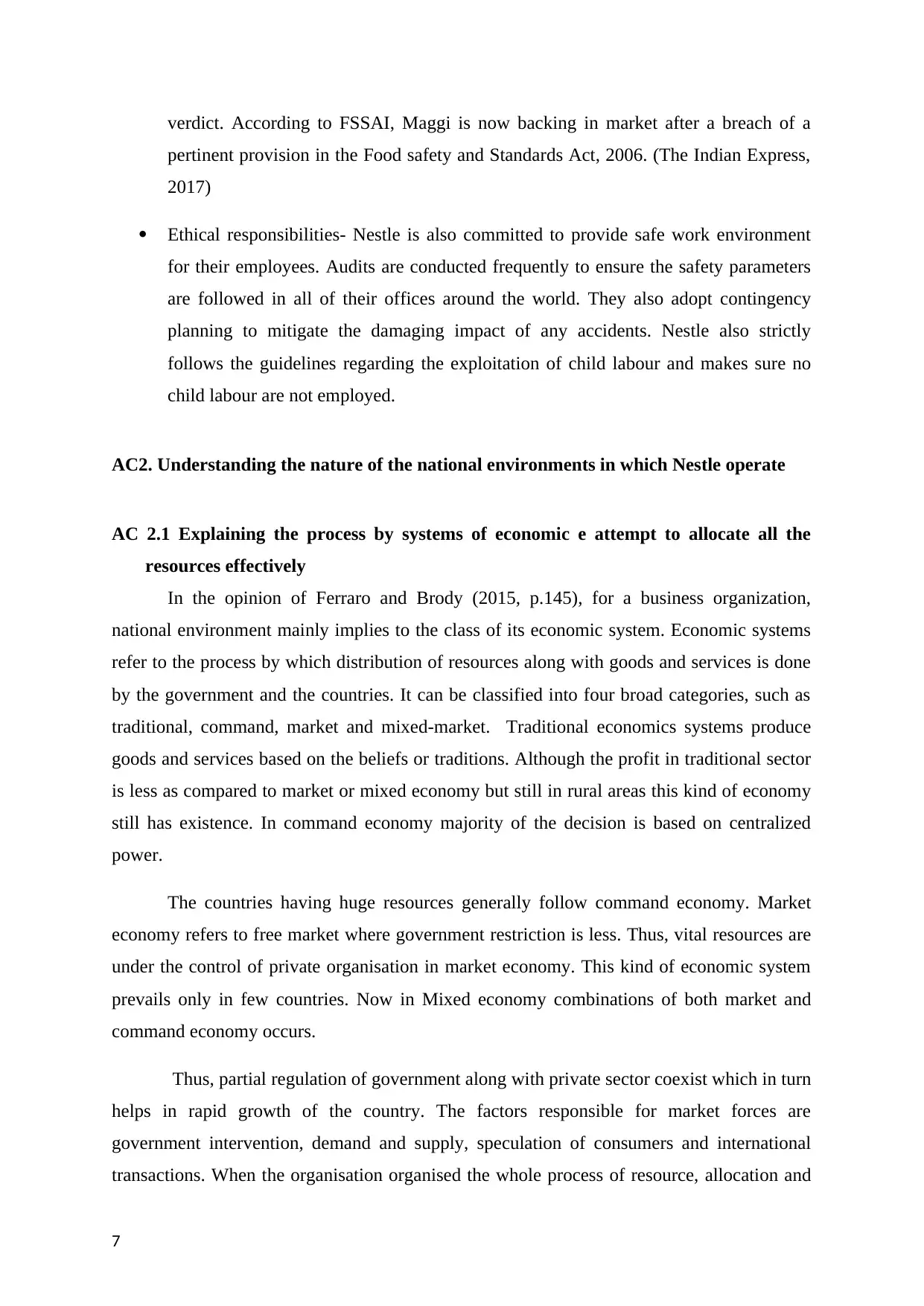
verdict. According to FSSAI, Maggi is now backing in market after a breach of a
pertinent provision in the Food safety and Standards Act, 2006. (The Indian Express,
2017)
Ethical responsibilities- Nestle is also committed to provide safe work environment
for their employees. Audits are conducted frequently to ensure the safety parameters
are followed in all of their offices around the world. They also adopt contingency
planning to mitigate the damaging impact of any accidents. Nestle also strictly
follows the guidelines regarding the exploitation of child labour and makes sure no
child labour are not employed.
AC2. Understanding the nature of the national environments in which Nestle operate
AC 2.1 Explaining the process by systems of economic e attempt to allocate all the
resources effectively
In the opinion of Ferraro and Brody (2015, p.145), for a business organization,
national environment mainly implies to the class of its economic system. Economic systems
refer to the process by which distribution of resources along with goods and services is done
by the government and the countries. It can be classified into four broad categories, such as
traditional, command, market and mixed-market. Traditional economics systems produce
goods and services based on the beliefs or traditions. Although the profit in traditional sector
is less as compared to market or mixed economy but still in rural areas this kind of economy
still has existence. In command economy majority of the decision is based on centralized
power.
The countries having huge resources generally follow command economy. Market
economy refers to free market where government restriction is less. Thus, vital resources are
under the control of private organisation in market economy. This kind of economic system
prevails only in few countries. Now in Mixed economy combinations of both market and
command economy occurs.
Thus, partial regulation of government along with private sector coexist which in turn
helps in rapid growth of the country. The factors responsible for market forces are
government intervention, demand and supply, speculation of consumers and international
transactions. When the organisation organised the whole process of resource, allocation and
7
pertinent provision in the Food safety and Standards Act, 2006. (The Indian Express,
2017)
Ethical responsibilities- Nestle is also committed to provide safe work environment
for their employees. Audits are conducted frequently to ensure the safety parameters
are followed in all of their offices around the world. They also adopt contingency
planning to mitigate the damaging impact of any accidents. Nestle also strictly
follows the guidelines regarding the exploitation of child labour and makes sure no
child labour are not employed.
AC2. Understanding the nature of the national environments in which Nestle operate
AC 2.1 Explaining the process by systems of economic e attempt to allocate all the
resources effectively
In the opinion of Ferraro and Brody (2015, p.145), for a business organization,
national environment mainly implies to the class of its economic system. Economic systems
refer to the process by which distribution of resources along with goods and services is done
by the government and the countries. It can be classified into four broad categories, such as
traditional, command, market and mixed-market. Traditional economics systems produce
goods and services based on the beliefs or traditions. Although the profit in traditional sector
is less as compared to market or mixed economy but still in rural areas this kind of economy
still has existence. In command economy majority of the decision is based on centralized
power.
The countries having huge resources generally follow command economy. Market
economy refers to free market where government restriction is less. Thus, vital resources are
under the control of private organisation in market economy. This kind of economic system
prevails only in few countries. Now in Mixed economy combinations of both market and
command economy occurs.
Thus, partial regulation of government along with private sector coexist which in turn
helps in rapid growth of the country. The factors responsible for market forces are
government intervention, demand and supply, speculation of consumers and international
transactions. When the organisation organised the whole process of resource, allocation and
7
Paraphrase This Document
Need a fresh take? Get an instant paraphrase of this document with our AI Paraphraser
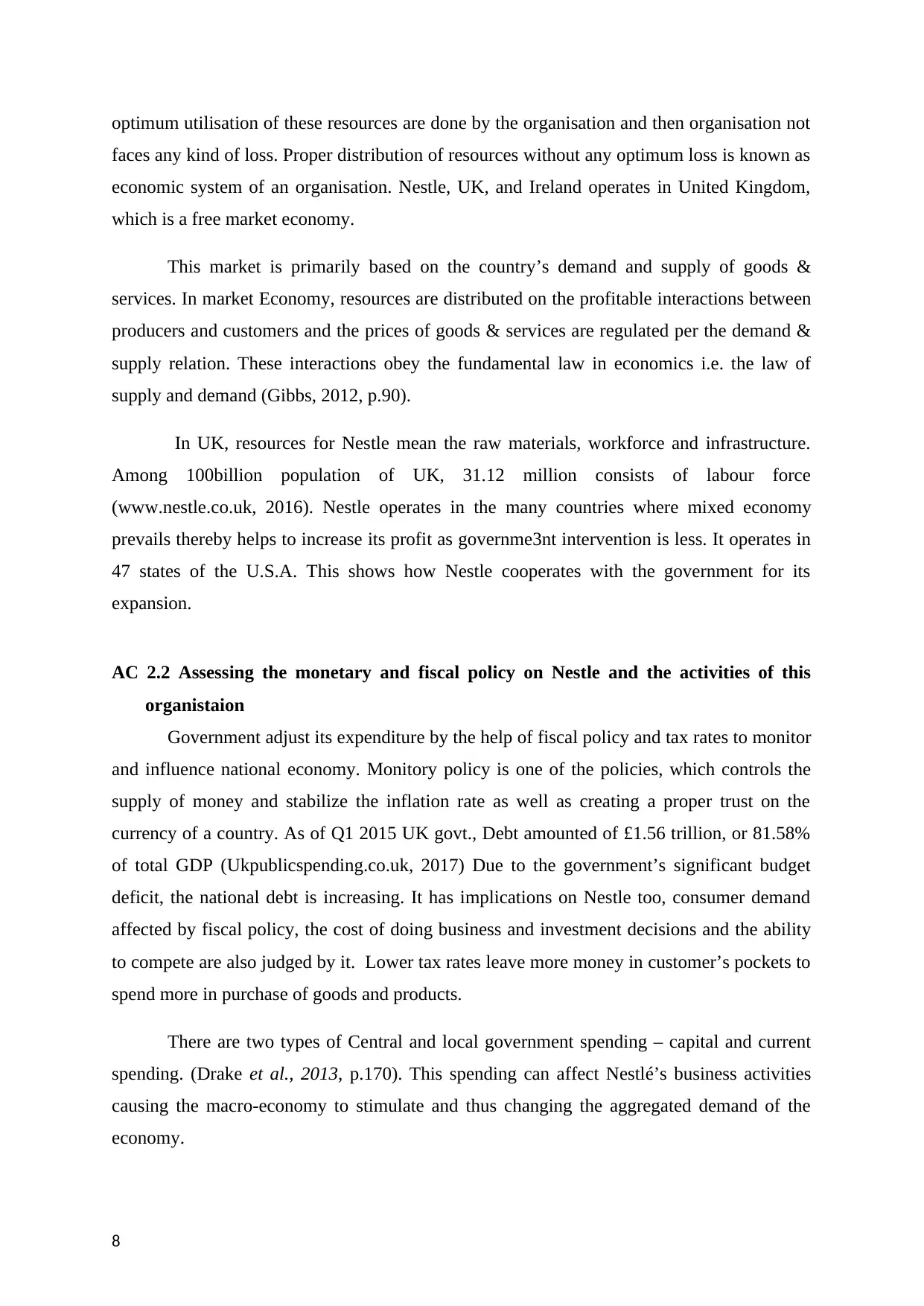
optimum utilisation of these resources are done by the organisation and then organisation not
faces any kind of loss. Proper distribution of resources without any optimum loss is known as
economic system of an organisation. Nestle, UK, and Ireland operates in United Kingdom,
which is a free market economy.
This market is primarily based on the country’s demand and supply of goods &
services. In market Economy, resources are distributed on the profitable interactions between
producers and customers and the prices of goods & services are regulated per the demand &
supply relation. These interactions obey the fundamental law in economics i.e. the law of
supply and demand (Gibbs, 2012, p.90).
In UK, resources for Nestle mean the raw materials, workforce and infrastructure.
Among 100billion population of UK, 31.12 million consists of labour force
(www.nestle.co.uk, 2016). Nestle operates in the many countries where mixed economy
prevails thereby helps to increase its profit as governme3nt intervention is less. It operates in
47 states of the U.S.A. This shows how Nestle cooperates with the government for its
expansion.
AC 2.2 Assessing the monetary and fiscal policy on Nestle and the activities of this
organistaion
Government adjust its expenditure by the help of fiscal policy and tax rates to monitor
and influence national economy. Monitory policy is one of the policies, which controls the
supply of money and stabilize the inflation rate as well as creating a proper trust on the
currency of a country. As of Q1 2015 UK govt., Debt amounted of £1.56 trillion, or 81.58%
of total GDP (Ukpublicspending.co.uk, 2017) Due to the government’s significant budget
deficit, the national debt is increasing. It has implications on Nestle too, consumer demand
affected by fiscal policy, the cost of doing business and investment decisions and the ability
to compete are also judged by it. Lower tax rates leave more money in customer’s pockets to
spend more in purchase of goods and products.
There are two types of Central and local government spending – capital and current
spending. (Drake et al., 2013, p.170). This spending can affect Nestlé’s business activities
causing the macro-economy to stimulate and thus changing the aggregated demand of the
economy.
8
faces any kind of loss. Proper distribution of resources without any optimum loss is known as
economic system of an organisation. Nestle, UK, and Ireland operates in United Kingdom,
which is a free market economy.
This market is primarily based on the country’s demand and supply of goods &
services. In market Economy, resources are distributed on the profitable interactions between
producers and customers and the prices of goods & services are regulated per the demand &
supply relation. These interactions obey the fundamental law in economics i.e. the law of
supply and demand (Gibbs, 2012, p.90).
In UK, resources for Nestle mean the raw materials, workforce and infrastructure.
Among 100billion population of UK, 31.12 million consists of labour force
(www.nestle.co.uk, 2016). Nestle operates in the many countries where mixed economy
prevails thereby helps to increase its profit as governme3nt intervention is less. It operates in
47 states of the U.S.A. This shows how Nestle cooperates with the government for its
expansion.
AC 2.2 Assessing the monetary and fiscal policy on Nestle and the activities of this
organistaion
Government adjust its expenditure by the help of fiscal policy and tax rates to monitor
and influence national economy. Monitory policy is one of the policies, which controls the
supply of money and stabilize the inflation rate as well as creating a proper trust on the
currency of a country. As of Q1 2015 UK govt., Debt amounted of £1.56 trillion, or 81.58%
of total GDP (Ukpublicspending.co.uk, 2017) Due to the government’s significant budget
deficit, the national debt is increasing. It has implications on Nestle too, consumer demand
affected by fiscal policy, the cost of doing business and investment decisions and the ability
to compete are also judged by it. Lower tax rates leave more money in customer’s pockets to
spend more in purchase of goods and products.
There are two types of Central and local government spending – capital and current
spending. (Drake et al., 2013, p.170). This spending can affect Nestlé’s business activities
causing the macro-economy to stimulate and thus changing the aggregated demand of the
economy.
8
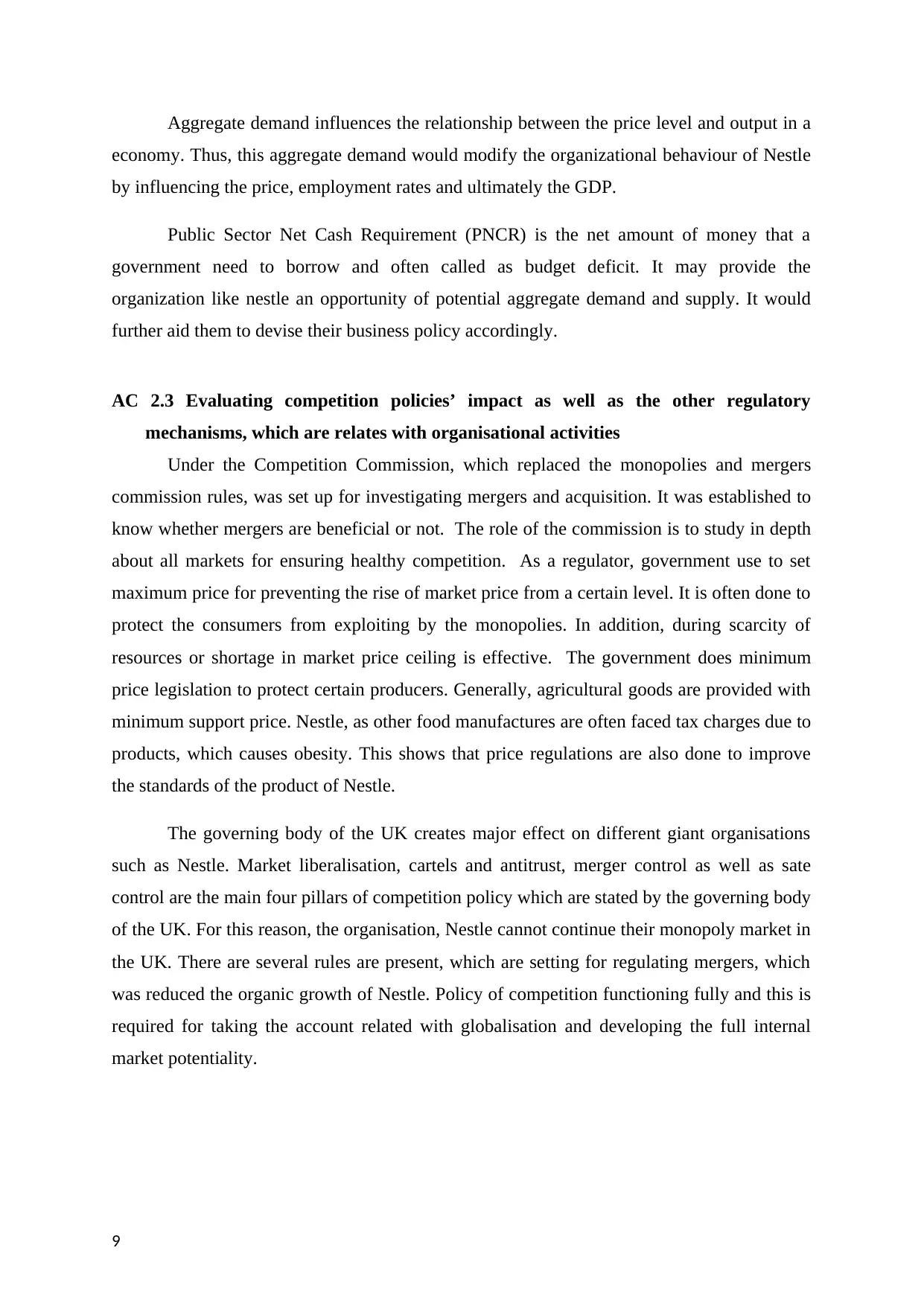
Aggregate demand influences the relationship between the price level and output in a
economy. Thus, this aggregate demand would modify the organizational behaviour of Nestle
by influencing the price, employment rates and ultimately the GDP.
Public Sector Net Cash Requirement (PNCR) is the net amount of money that a
government need to borrow and often called as budget deficit. It may provide the
organization like nestle an opportunity of potential aggregate demand and supply. It would
further aid them to devise their business policy accordingly.
AC 2.3 Evaluating competition policies’ impact as well as the other regulatory
mechanisms, which are relates with organisational activities
Under the Competition Commission, which replaced the monopolies and mergers
commission rules, was set up for investigating mergers and acquisition. It was established to
know whether mergers are beneficial or not. The role of the commission is to study in depth
about all markets for ensuring healthy competition. As a regulator, government use to set
maximum price for preventing the rise of market price from a certain level. It is often done to
protect the consumers from exploiting by the monopolies. In addition, during scarcity of
resources or shortage in market price ceiling is effective. The government does minimum
price legislation to protect certain producers. Generally, agricultural goods are provided with
minimum support price. Nestle, as other food manufactures are often faced tax charges due to
products, which causes obesity. This shows that price regulations are also done to improve
the standards of the product of Nestle.
The governing body of the UK creates major effect on different giant organisations
such as Nestle. Market liberalisation, cartels and antitrust, merger control as well as sate
control are the main four pillars of competition policy which are stated by the governing body
of the UK. For this reason, the organisation, Nestle cannot continue their monopoly market in
the UK. There are several rules are present, which are setting for regulating mergers, which
was reduced the organic growth of Nestle. Policy of competition functioning fully and this is
required for taking the account related with globalisation and developing the full internal
market potentiality.
9
economy. Thus, this aggregate demand would modify the organizational behaviour of Nestle
by influencing the price, employment rates and ultimately the GDP.
Public Sector Net Cash Requirement (PNCR) is the net amount of money that a
government need to borrow and often called as budget deficit. It may provide the
organization like nestle an opportunity of potential aggregate demand and supply. It would
further aid them to devise their business policy accordingly.
AC 2.3 Evaluating competition policies’ impact as well as the other regulatory
mechanisms, which are relates with organisational activities
Under the Competition Commission, which replaced the monopolies and mergers
commission rules, was set up for investigating mergers and acquisition. It was established to
know whether mergers are beneficial or not. The role of the commission is to study in depth
about all markets for ensuring healthy competition. As a regulator, government use to set
maximum price for preventing the rise of market price from a certain level. It is often done to
protect the consumers from exploiting by the monopolies. In addition, during scarcity of
resources or shortage in market price ceiling is effective. The government does minimum
price legislation to protect certain producers. Generally, agricultural goods are provided with
minimum support price. Nestle, as other food manufactures are often faced tax charges due to
products, which causes obesity. This shows that price regulations are also done to improve
the standards of the product of Nestle.
The governing body of the UK creates major effect on different giant organisations
such as Nestle. Market liberalisation, cartels and antitrust, merger control as well as sate
control are the main four pillars of competition policy which are stated by the governing body
of the UK. For this reason, the organisation, Nestle cannot continue their monopoly market in
the UK. There are several rules are present, which are setting for regulating mergers, which
was reduced the organic growth of Nestle. Policy of competition functioning fully and this is
required for taking the account related with globalisation and developing the full internal
market potentiality.
9
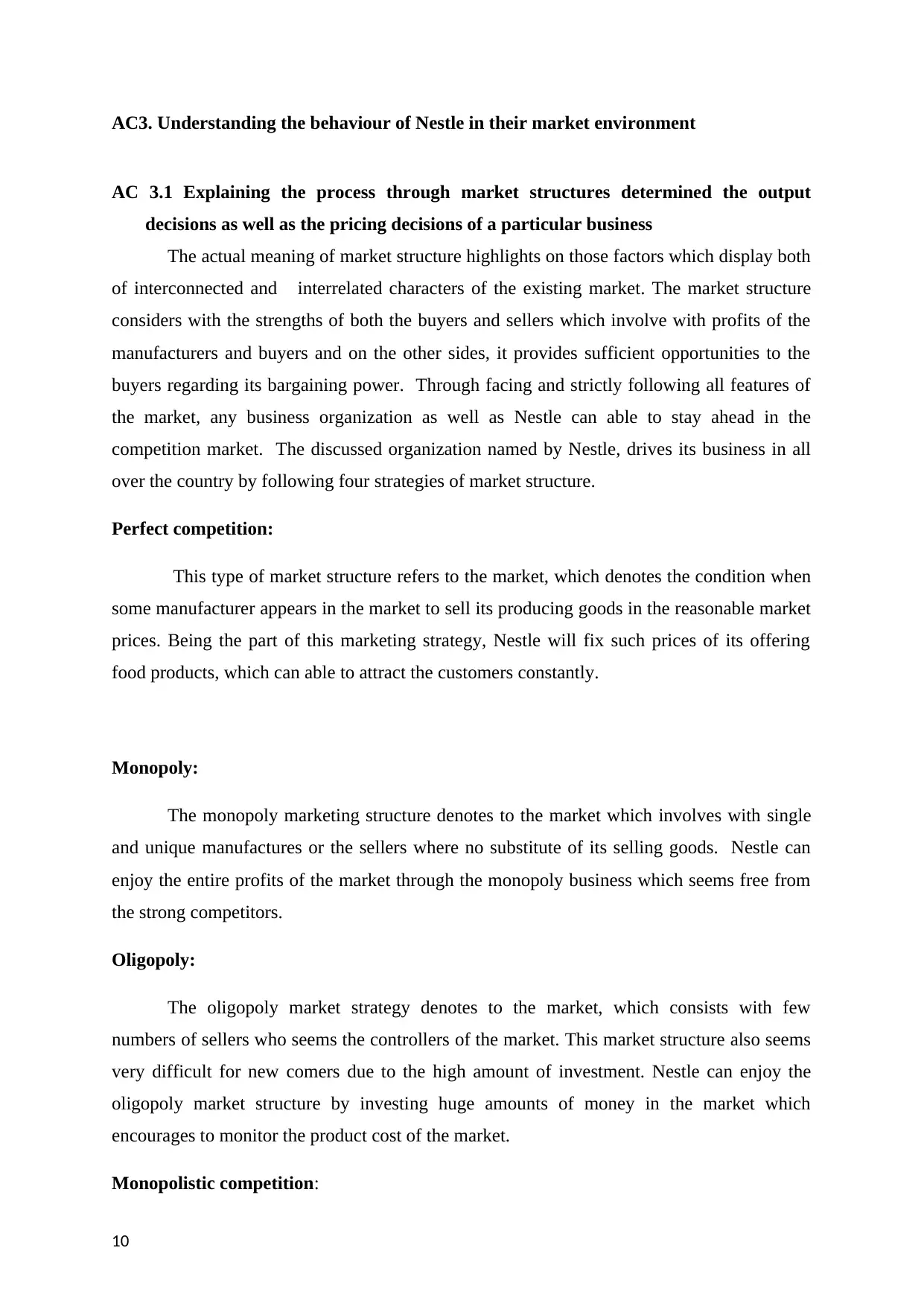
AC3. Understanding the behaviour of Nestle in their market environment
AC 3.1 Explaining the process through market structures determined the output
decisions as well as the pricing decisions of a particular business
The actual meaning of market structure highlights on those factors which display both
of interconnected and interrelated characters of the existing market. The market structure
considers with the strengths of both the buyers and sellers which involve with profits of the
manufacturers and buyers and on the other sides, it provides sufficient opportunities to the
buyers regarding its bargaining power. Through facing and strictly following all features of
the market, any business organization as well as Nestle can able to stay ahead in the
competition market. The discussed organization named by Nestle, drives its business in all
over the country by following four strategies of market structure.
Perfect competition:
This type of market structure refers to the market, which denotes the condition when
some manufacturer appears in the market to sell its producing goods in the reasonable market
prices. Being the part of this marketing strategy, Nestle will fix such prices of its offering
food products, which can able to attract the customers constantly.
Monopoly:
The monopoly marketing structure denotes to the market which involves with single
and unique manufactures or the sellers where no substitute of its selling goods. Nestle can
enjoy the entire profits of the market through the monopoly business which seems free from
the strong competitors.
Oligopoly:
The oligopoly market strategy denotes to the market, which consists with few
numbers of sellers who seems the controllers of the market. This market structure also seems
very difficult for new comers due to the high amount of investment. Nestle can enjoy the
oligopoly market structure by investing huge amounts of money in the market which
encourages to monitor the product cost of the market.
Monopolistic competition:
10
AC 3.1 Explaining the process through market structures determined the output
decisions as well as the pricing decisions of a particular business
The actual meaning of market structure highlights on those factors which display both
of interconnected and interrelated characters of the existing market. The market structure
considers with the strengths of both the buyers and sellers which involve with profits of the
manufacturers and buyers and on the other sides, it provides sufficient opportunities to the
buyers regarding its bargaining power. Through facing and strictly following all features of
the market, any business organization as well as Nestle can able to stay ahead in the
competition market. The discussed organization named by Nestle, drives its business in all
over the country by following four strategies of market structure.
Perfect competition:
This type of market structure refers to the market, which denotes the condition when
some manufacturer appears in the market to sell its producing goods in the reasonable market
prices. Being the part of this marketing strategy, Nestle will fix such prices of its offering
food products, which can able to attract the customers constantly.
Monopoly:
The monopoly marketing structure denotes to the market which involves with single
and unique manufactures or the sellers where no substitute of its selling goods. Nestle can
enjoy the entire profits of the market through the monopoly business which seems free from
the strong competitors.
Oligopoly:
The oligopoly market strategy denotes to the market, which consists with few
numbers of sellers who seems the controllers of the market. This market structure also seems
very difficult for new comers due to the high amount of investment. Nestle can enjoy the
oligopoly market structure by investing huge amounts of money in the market which
encourages to monitor the product cost of the market.
Monopolistic competition:
10
Secure Best Marks with AI Grader
Need help grading? Try our AI Grader for instant feedback on your assignments.
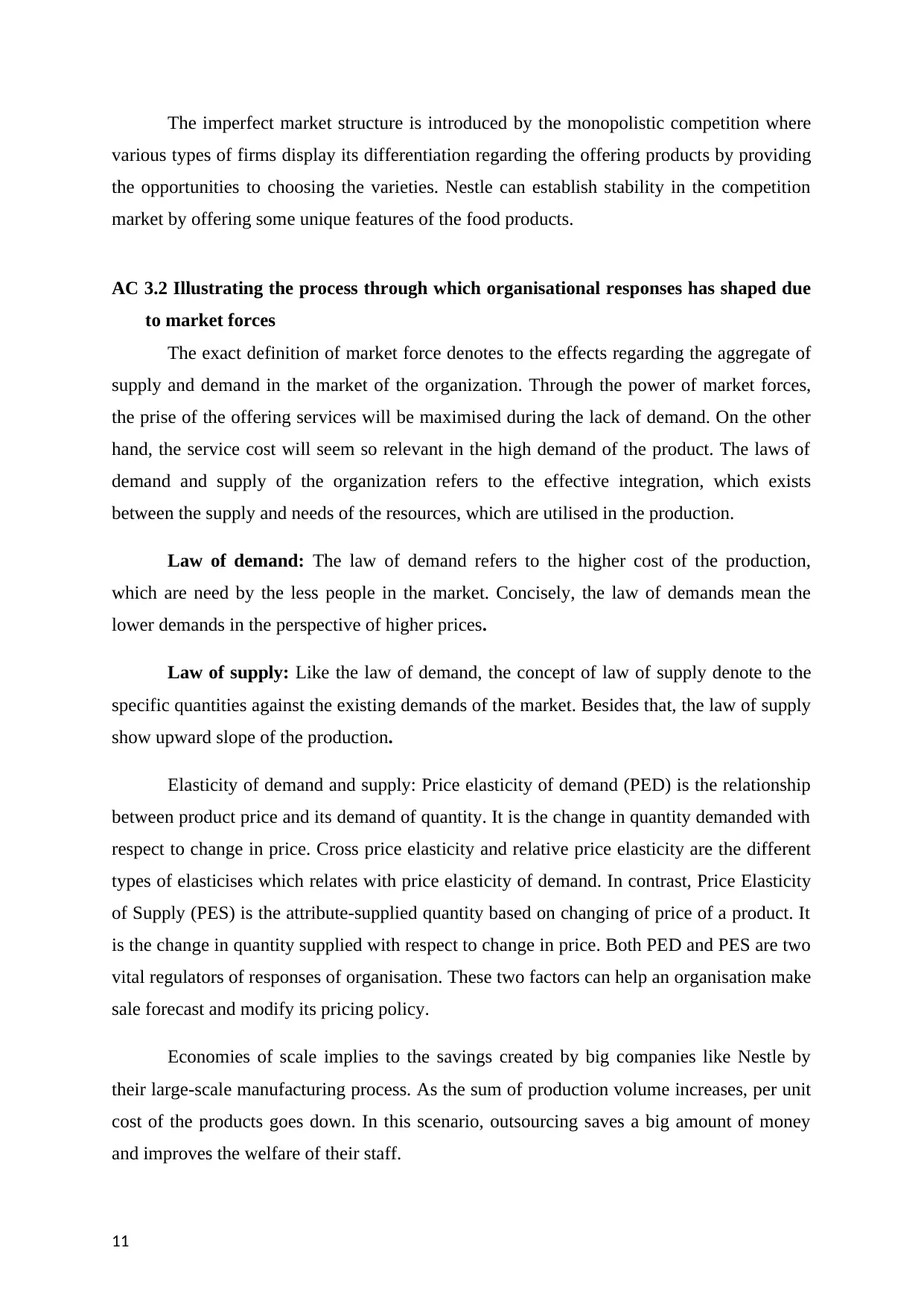
The imperfect market structure is introduced by the monopolistic competition where
various types of firms display its differentiation regarding the offering products by providing
the opportunities to choosing the varieties. Nestle can establish stability in the competition
market by offering some unique features of the food products.
AC 3.2 Illustrating the process through which organisational responses has shaped due
to market forces
The exact definition of market force denotes to the effects regarding the aggregate of
supply and demand in the market of the organization. Through the power of market forces,
the prise of the offering services will be maximised during the lack of demand. On the other
hand, the service cost will seem so relevant in the high demand of the product. The laws of
demand and supply of the organization refers to the effective integration, which exists
between the supply and needs of the resources, which are utilised in the production.
Law of demand: The law of demand refers to the higher cost of the production,
which are need by the less people in the market. Concisely, the law of demands mean the
lower demands in the perspective of higher prices.
Law of supply: Like the law of demand, the concept of law of supply denote to the
specific quantities against the existing demands of the market. Besides that, the law of supply
show upward slope of the production.
Elasticity of demand and supply: Price elasticity of demand (PED) is the relationship
between product price and its demand of quantity. It is the change in quantity demanded with
respect to change in price. Cross price elasticity and relative price elasticity are the different
types of elasticises which relates with price elasticity of demand. In contrast, Price Elasticity
of Supply (PES) is the attribute-supplied quantity based on changing of price of a product. It
is the change in quantity supplied with respect to change in price. Both PED and PES are two
vital regulators of responses of organisation. These two factors can help an organisation make
sale forecast and modify its pricing policy.
Economies of scale implies to the savings created by big companies like Nestle by
their large-scale manufacturing process. As the sum of production volume increases, per unit
cost of the products goes down. In this scenario, outsourcing saves a big amount of money
and improves the welfare of their staff.
11
various types of firms display its differentiation regarding the offering products by providing
the opportunities to choosing the varieties. Nestle can establish stability in the competition
market by offering some unique features of the food products.
AC 3.2 Illustrating the process through which organisational responses has shaped due
to market forces
The exact definition of market force denotes to the effects regarding the aggregate of
supply and demand in the market of the organization. Through the power of market forces,
the prise of the offering services will be maximised during the lack of demand. On the other
hand, the service cost will seem so relevant in the high demand of the product. The laws of
demand and supply of the organization refers to the effective integration, which exists
between the supply and needs of the resources, which are utilised in the production.
Law of demand: The law of demand refers to the higher cost of the production,
which are need by the less people in the market. Concisely, the law of demands mean the
lower demands in the perspective of higher prices.
Law of supply: Like the law of demand, the concept of law of supply denote to the
specific quantities against the existing demands of the market. Besides that, the law of supply
show upward slope of the production.
Elasticity of demand and supply: Price elasticity of demand (PED) is the relationship
between product price and its demand of quantity. It is the change in quantity demanded with
respect to change in price. Cross price elasticity and relative price elasticity are the different
types of elasticises which relates with price elasticity of demand. In contrast, Price Elasticity
of Supply (PES) is the attribute-supplied quantity based on changing of price of a product. It
is the change in quantity supplied with respect to change in price. Both PED and PES are two
vital regulators of responses of organisation. These two factors can help an organisation make
sale forecast and modify its pricing policy.
Economies of scale implies to the savings created by big companies like Nestle by
their large-scale manufacturing process. As the sum of production volume increases, per unit
cost of the products goes down. In this scenario, outsourcing saves a big amount of money
and improves the welfare of their staff.
11
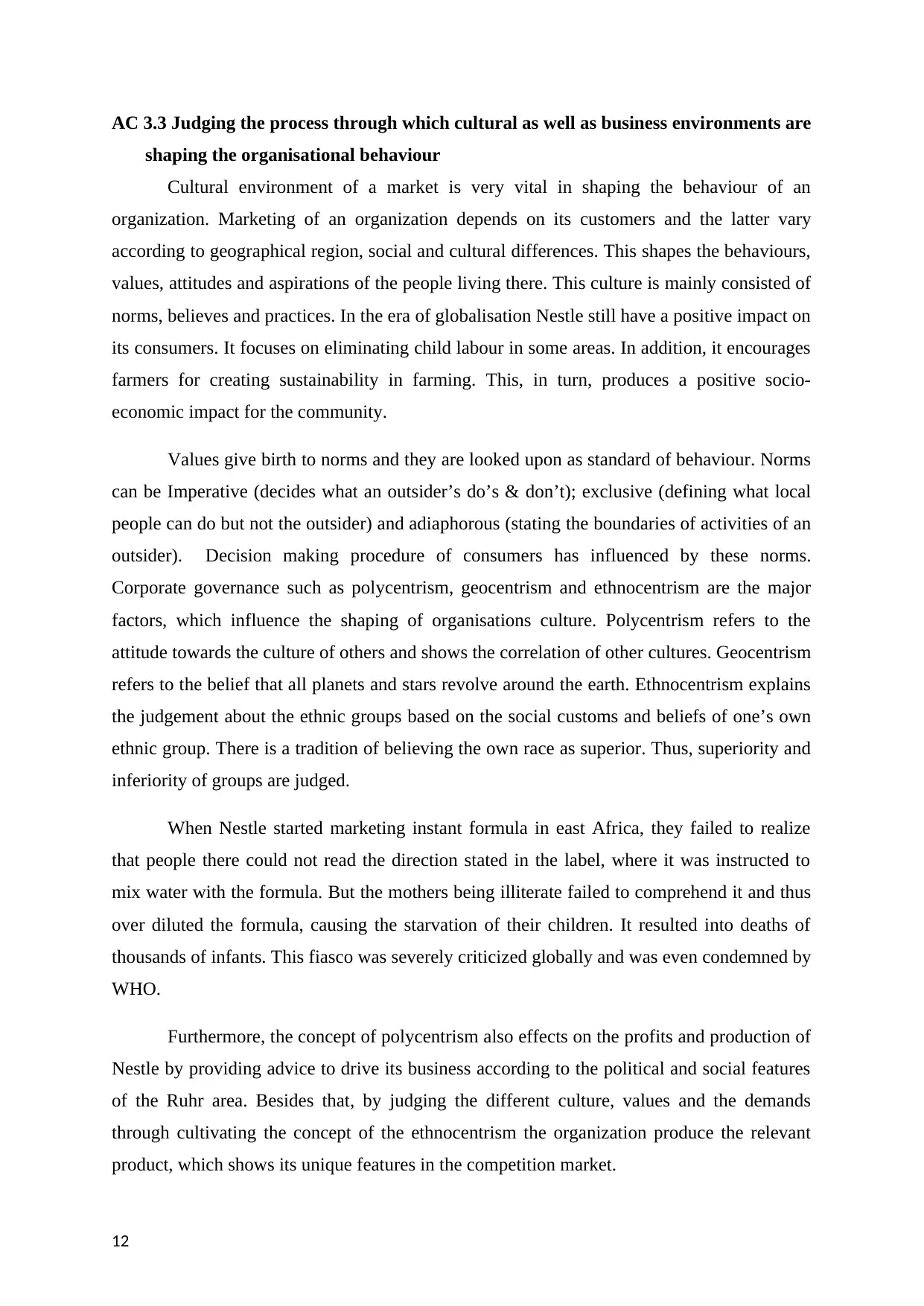
AC 3.3 Judging the process through which cultural as well as business environments are
shaping the organisational behaviour
Cultural environment of a market is very vital in shaping the behaviour of an
organization. Marketing of an organization depends on its customers and the latter vary
according to geographical region, social and cultural differences. This shapes the behaviours,
values, attitudes and aspirations of the people living there. This culture is mainly consisted of
norms, believes and practices. In the era of globalisation Nestle still have a positive impact on
its consumers. It focuses on eliminating child labour in some areas. In addition, it encourages
farmers for creating sustainability in farming. This, in turn, produces a positive socio-
economic impact for the community.
Values give birth to norms and they are looked upon as standard of behaviour. Norms
can be Imperative (decides what an outsider’s do’s & don’t); exclusive (defining what local
people can do but not the outsider) and adiaphorous (stating the boundaries of activities of an
outsider). Decision making procedure of consumers has influenced by these norms.
Corporate governance such as polycentrism, geocentrism and ethnocentrism are the major
factors, which influence the shaping of organisations culture. Polycentrism refers to the
attitude towards the culture of others and shows the correlation of other cultures. Geocentrism
refers to the belief that all planets and stars revolve around the earth. Ethnocentrism explains
the judgement about the ethnic groups based on the social customs and beliefs of one’s own
ethnic group. There is a tradition of believing the own race as superior. Thus, superiority and
inferiority of groups are judged.
When Nestle started marketing instant formula in east Africa, they failed to realize
that people there could not read the direction stated in the label, where it was instructed to
mix water with the formula. But the mothers being illiterate failed to comprehend it and thus
over diluted the formula, causing the starvation of their children. It resulted into deaths of
thousands of infants. This fiasco was severely criticized globally and was even condemned by
WHO.
Furthermore, the concept of polycentrism also effects on the profits and production of
Nestle by providing advice to drive its business according to the political and social features
of the Ruhr area. Besides that, by judging the different culture, values and the demands
through cultivating the concept of the ethnocentrism the organization produce the relevant
product, which shows its unique features in the competition market.
12
shaping the organisational behaviour
Cultural environment of a market is very vital in shaping the behaviour of an
organization. Marketing of an organization depends on its customers and the latter vary
according to geographical region, social and cultural differences. This shapes the behaviours,
values, attitudes and aspirations of the people living there. This culture is mainly consisted of
norms, believes and practices. In the era of globalisation Nestle still have a positive impact on
its consumers. It focuses on eliminating child labour in some areas. In addition, it encourages
farmers for creating sustainability in farming. This, in turn, produces a positive socio-
economic impact for the community.
Values give birth to norms and they are looked upon as standard of behaviour. Norms
can be Imperative (decides what an outsider’s do’s & don’t); exclusive (defining what local
people can do but not the outsider) and adiaphorous (stating the boundaries of activities of an
outsider). Decision making procedure of consumers has influenced by these norms.
Corporate governance such as polycentrism, geocentrism and ethnocentrism are the major
factors, which influence the shaping of organisations culture. Polycentrism refers to the
attitude towards the culture of others and shows the correlation of other cultures. Geocentrism
refers to the belief that all planets and stars revolve around the earth. Ethnocentrism explains
the judgement about the ethnic groups based on the social customs and beliefs of one’s own
ethnic group. There is a tradition of believing the own race as superior. Thus, superiority and
inferiority of groups are judged.
When Nestle started marketing instant formula in east Africa, they failed to realize
that people there could not read the direction stated in the label, where it was instructed to
mix water with the formula. But the mothers being illiterate failed to comprehend it and thus
over diluted the formula, causing the starvation of their children. It resulted into deaths of
thousands of infants. This fiasco was severely criticized globally and was even condemned by
WHO.
Furthermore, the concept of polycentrism also effects on the profits and production of
Nestle by providing advice to drive its business according to the political and social features
of the Ruhr area. Besides that, by judging the different culture, values and the demands
through cultivating the concept of the ethnocentrism the organization produce the relevant
product, which shows its unique features in the competition market.
12
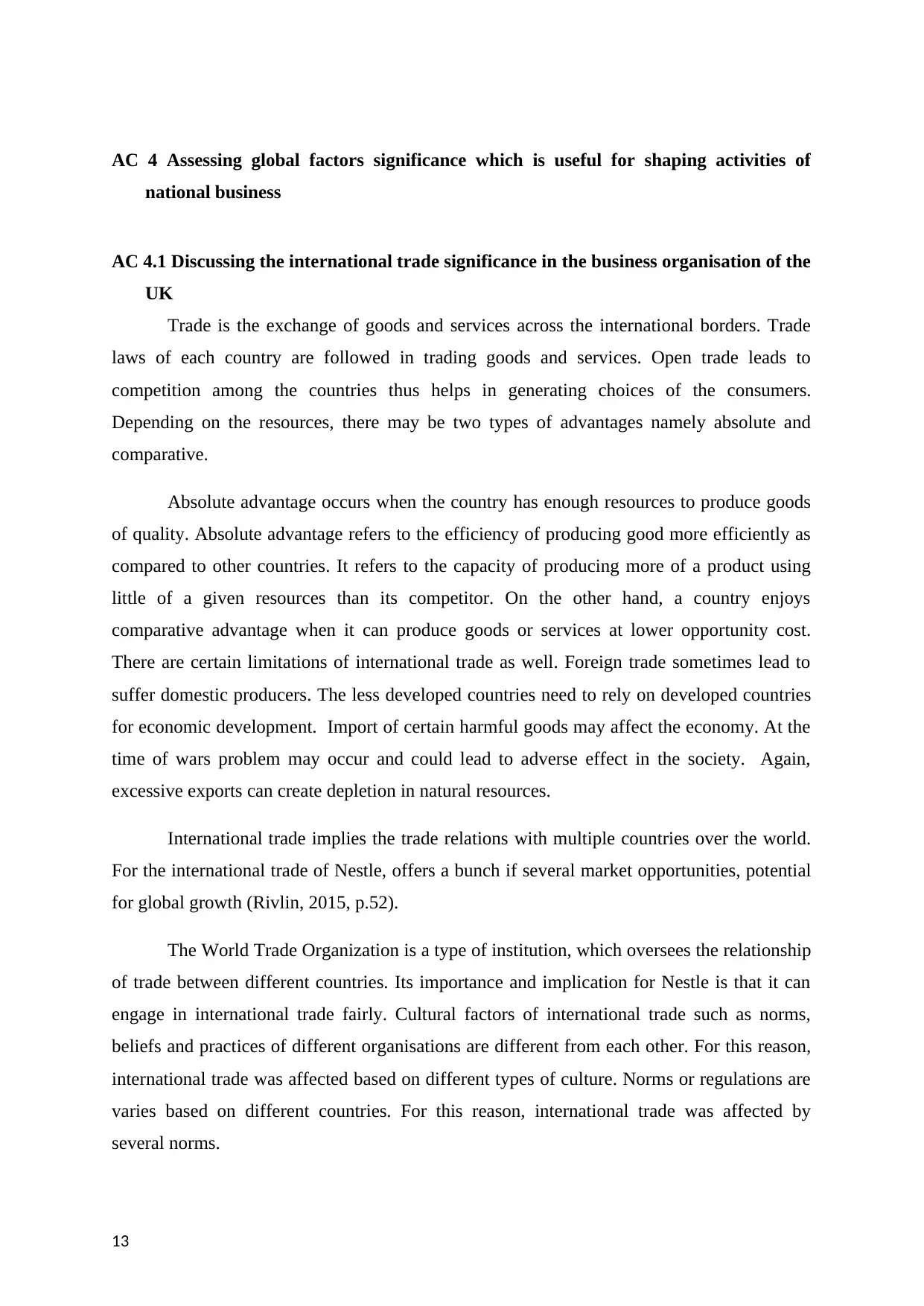
AC 4 Assessing global factors significance which is useful for shaping activities of
national business
AC 4.1 Discussing the international trade significance in the business organisation of the
UK
Trade is the exchange of goods and services across the international borders. Trade
laws of each country are followed in trading goods and services. Open trade leads to
competition among the countries thus helps in generating choices of the consumers.
Depending on the resources, there may be two types of advantages namely absolute and
comparative.
Absolute advantage occurs when the country has enough resources to produce goods
of quality. Absolute advantage refers to the efficiency of producing good more efficiently as
compared to other countries. It refers to the capacity of producing more of a product using
little of a given resources than its competitor. On the other hand, a country enjoys
comparative advantage when it can produce goods or services at lower opportunity cost.
There are certain limitations of international trade as well. Foreign trade sometimes lead to
suffer domestic producers. The less developed countries need to rely on developed countries
for economic development. Import of certain harmful goods may affect the economy. At the
time of wars problem may occur and could lead to adverse effect in the society. Again,
excessive exports can create depletion in natural resources.
International trade implies the trade relations with multiple countries over the world.
For the international trade of Nestle, offers a bunch if several market opportunities, potential
for global growth (Rivlin, 2015, p.52).
The World Trade Organization is a type of institution, which oversees the relationship
of trade between different countries. Its importance and implication for Nestle is that it can
engage in international trade fairly. Cultural factors of international trade such as norms,
beliefs and practices of different organisations are different from each other. For this reason,
international trade was affected based on different types of culture. Norms or regulations are
varies based on different countries. For this reason, international trade was affected by
several norms.
13
national business
AC 4.1 Discussing the international trade significance in the business organisation of the
UK
Trade is the exchange of goods and services across the international borders. Trade
laws of each country are followed in trading goods and services. Open trade leads to
competition among the countries thus helps in generating choices of the consumers.
Depending on the resources, there may be two types of advantages namely absolute and
comparative.
Absolute advantage occurs when the country has enough resources to produce goods
of quality. Absolute advantage refers to the efficiency of producing good more efficiently as
compared to other countries. It refers to the capacity of producing more of a product using
little of a given resources than its competitor. On the other hand, a country enjoys
comparative advantage when it can produce goods or services at lower opportunity cost.
There are certain limitations of international trade as well. Foreign trade sometimes lead to
suffer domestic producers. The less developed countries need to rely on developed countries
for economic development. Import of certain harmful goods may affect the economy. At the
time of wars problem may occur and could lead to adverse effect in the society. Again,
excessive exports can create depletion in natural resources.
International trade implies the trade relations with multiple countries over the world.
For the international trade of Nestle, offers a bunch if several market opportunities, potential
for global growth (Rivlin, 2015, p.52).
The World Trade Organization is a type of institution, which oversees the relationship
of trade between different countries. Its importance and implication for Nestle is that it can
engage in international trade fairly. Cultural factors of international trade such as norms,
beliefs and practices of different organisations are different from each other. For this reason,
international trade was affected based on different types of culture. Norms or regulations are
varies based on different countries. For this reason, international trade was affected by
several norms.
13
Paraphrase This Document
Need a fresh take? Get an instant paraphrase of this document with our AI Paraphraser
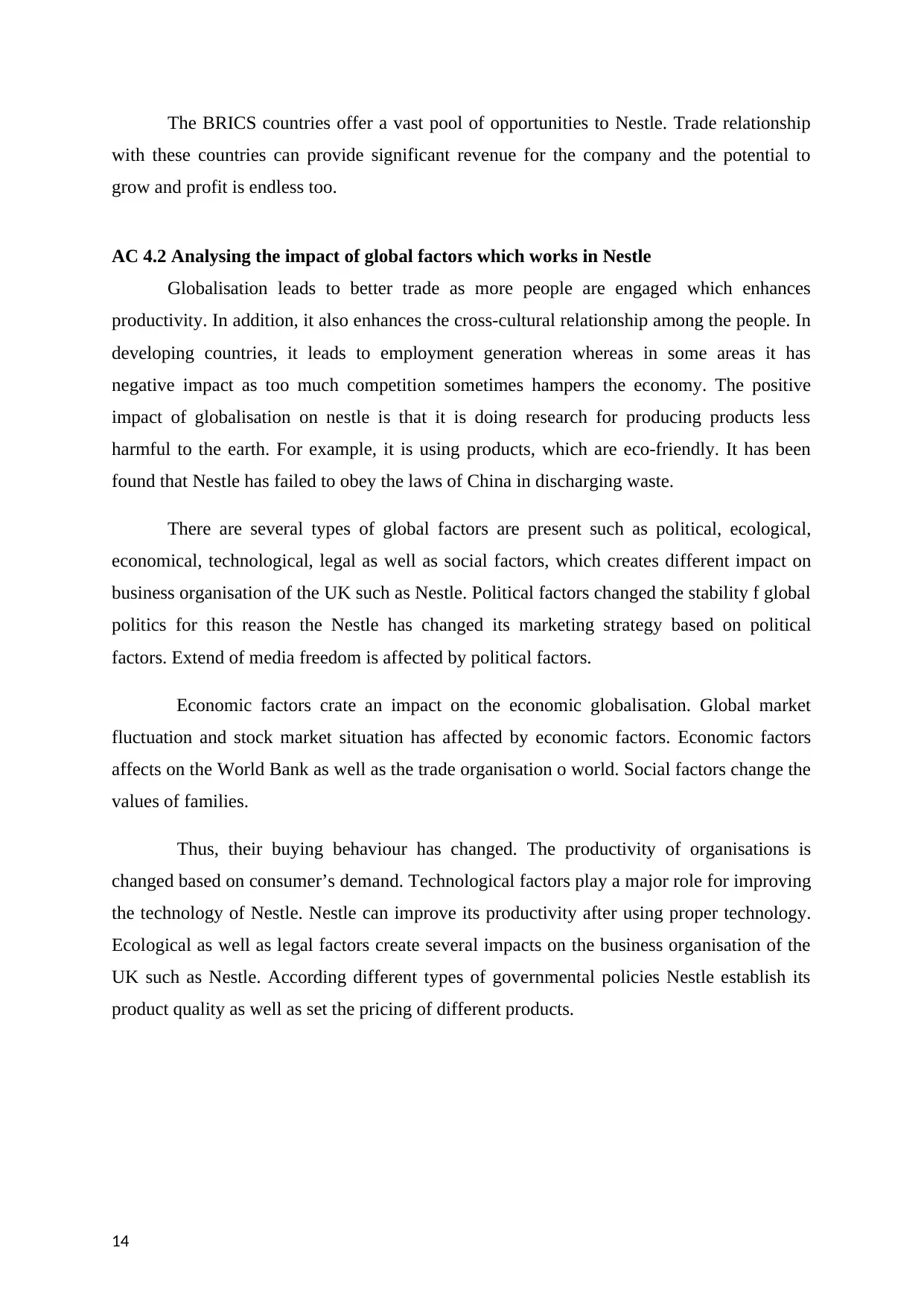
The BRICS countries offer a vast pool of opportunities to Nestle. Trade relationship
with these countries can provide significant revenue for the company and the potential to
grow and profit is endless too.
AC 4.2 Analysing the impact of global factors which works in Nestle
Globalisation leads to better trade as more people are engaged which enhances
productivity. In addition, it also enhances the cross-cultural relationship among the people. In
developing countries, it leads to employment generation whereas in some areas it has
negative impact as too much competition sometimes hampers the economy. The positive
impact of globalisation on nestle is that it is doing research for producing products less
harmful to the earth. For example, it is using products, which are eco-friendly. It has been
found that Nestle has failed to obey the laws of China in discharging waste.
There are several types of global factors are present such as political, ecological,
economical, technological, legal as well as social factors, which creates different impact on
business organisation of the UK such as Nestle. Political factors changed the stability f global
politics for this reason the Nestle has changed its marketing strategy based on political
factors. Extend of media freedom is affected by political factors.
Economic factors crate an impact on the economic globalisation. Global market
fluctuation and stock market situation has affected by economic factors. Economic factors
affects on the World Bank as well as the trade organisation o world. Social factors change the
values of families.
Thus, their buying behaviour has changed. The productivity of organisations is
changed based on consumer’s demand. Technological factors play a major role for improving
the technology of Nestle. Nestle can improve its productivity after using proper technology.
Ecological as well as legal factors create several impacts on the business organisation of the
UK such as Nestle. According different types of governmental policies Nestle establish its
product quality as well as set the pricing of different products.
14
with these countries can provide significant revenue for the company and the potential to
grow and profit is endless too.
AC 4.2 Analysing the impact of global factors which works in Nestle
Globalisation leads to better trade as more people are engaged which enhances
productivity. In addition, it also enhances the cross-cultural relationship among the people. In
developing countries, it leads to employment generation whereas in some areas it has
negative impact as too much competition sometimes hampers the economy. The positive
impact of globalisation on nestle is that it is doing research for producing products less
harmful to the earth. For example, it is using products, which are eco-friendly. It has been
found that Nestle has failed to obey the laws of China in discharging waste.
There are several types of global factors are present such as political, ecological,
economical, technological, legal as well as social factors, which creates different impact on
business organisation of the UK such as Nestle. Political factors changed the stability f global
politics for this reason the Nestle has changed its marketing strategy based on political
factors. Extend of media freedom is affected by political factors.
Economic factors crate an impact on the economic globalisation. Global market
fluctuation and stock market situation has affected by economic factors. Economic factors
affects on the World Bank as well as the trade organisation o world. Social factors change the
values of families.
Thus, their buying behaviour has changed. The productivity of organisations is
changed based on consumer’s demand. Technological factors play a major role for improving
the technology of Nestle. Nestle can improve its productivity after using proper technology.
Ecological as well as legal factors create several impacts on the business organisation of the
UK such as Nestle. According different types of governmental policies Nestle establish its
product quality as well as set the pricing of different products.
14
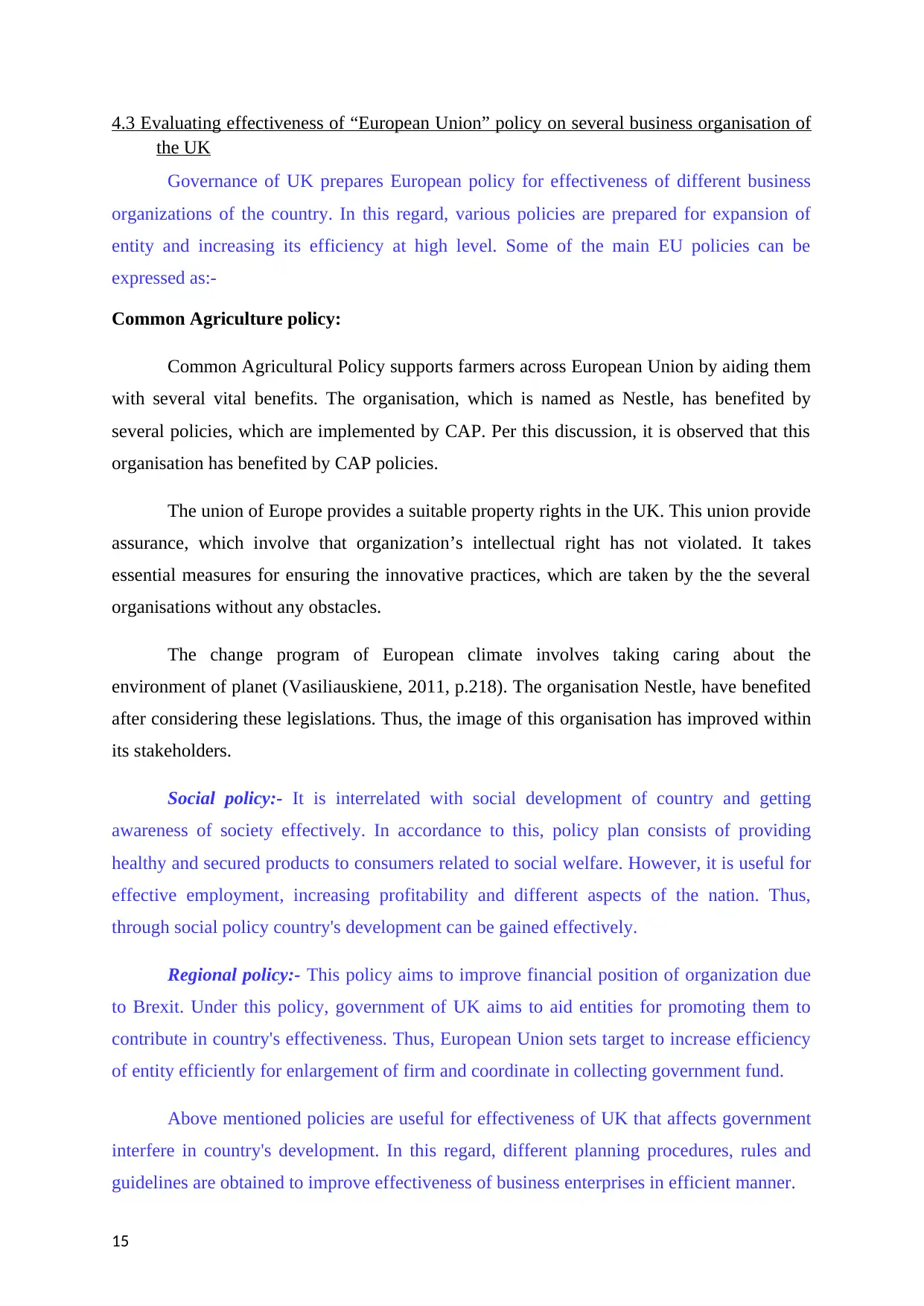
4.3 Evaluating effectiveness of “European Union” policy on several business organisation of
the UK
Governance of UK prepares European policy for effectiveness of different business
organizations of the country. In this regard, various policies are prepared for expansion of
entity and increasing its efficiency at high level. Some of the main EU policies can be
expressed as:-
Common Agriculture policy:
Common Agricultural Policy supports farmers across European Union by aiding them
with several vital benefits. The organisation, which is named as Nestle, has benefited by
several policies, which are implemented by CAP. Per this discussion, it is observed that this
organisation has benefited by CAP policies.
The union of Europe provides a suitable property rights in the UK. This union provide
assurance, which involve that organization’s intellectual right has not violated. It takes
essential measures for ensuring the innovative practices, which are taken by the the several
organisations without any obstacles.
The change program of European climate involves taking caring about the
environment of planet (Vasiliauskiene, 2011, p.218). The organisation Nestle, have benefited
after considering these legislations. Thus, the image of this organisation has improved within
its stakeholders.
Social policy:- It is interrelated with social development of country and getting
awareness of society effectively. In accordance to this, policy plan consists of providing
healthy and secured products to consumers related to social welfare. However, it is useful for
effective employment, increasing profitability and different aspects of the nation. Thus,
through social policy country's development can be gained effectively.
Regional policy:- This policy aims to improve financial position of organization due
to Brexit. Under this policy, government of UK aims to aid entities for promoting them to
contribute in country's effectiveness. Thus, European Union sets target to increase efficiency
of entity efficiently for enlargement of firm and coordinate in collecting government fund.
Above mentioned policies are useful for effectiveness of UK that affects government
interfere in country's development. In this regard, different planning procedures, rules and
guidelines are obtained to improve effectiveness of business enterprises in efficient manner.
15
the UK
Governance of UK prepares European policy for effectiveness of different business
organizations of the country. In this regard, various policies are prepared for expansion of
entity and increasing its efficiency at high level. Some of the main EU policies can be
expressed as:-
Common Agriculture policy:
Common Agricultural Policy supports farmers across European Union by aiding them
with several vital benefits. The organisation, which is named as Nestle, has benefited by
several policies, which are implemented by CAP. Per this discussion, it is observed that this
organisation has benefited by CAP policies.
The union of Europe provides a suitable property rights in the UK. This union provide
assurance, which involve that organization’s intellectual right has not violated. It takes
essential measures for ensuring the innovative practices, which are taken by the the several
organisations without any obstacles.
The change program of European climate involves taking caring about the
environment of planet (Vasiliauskiene, 2011, p.218). The organisation Nestle, have benefited
after considering these legislations. Thus, the image of this organisation has improved within
its stakeholders.
Social policy:- It is interrelated with social development of country and getting
awareness of society effectively. In accordance to this, policy plan consists of providing
healthy and secured products to consumers related to social welfare. However, it is useful for
effective employment, increasing profitability and different aspects of the nation. Thus,
through social policy country's development can be gained effectively.
Regional policy:- This policy aims to improve financial position of organization due
to Brexit. Under this policy, government of UK aims to aid entities for promoting them to
contribute in country's effectiveness. Thus, European Union sets target to increase efficiency
of entity efficiently for enlargement of firm and coordinate in collecting government fund.
Above mentioned policies are useful for effectiveness of UK that affects government
interfere in country's development. In this regard, different planning procedures, rules and
guidelines are obtained to improve effectiveness of business enterprises in efficient manner.
15
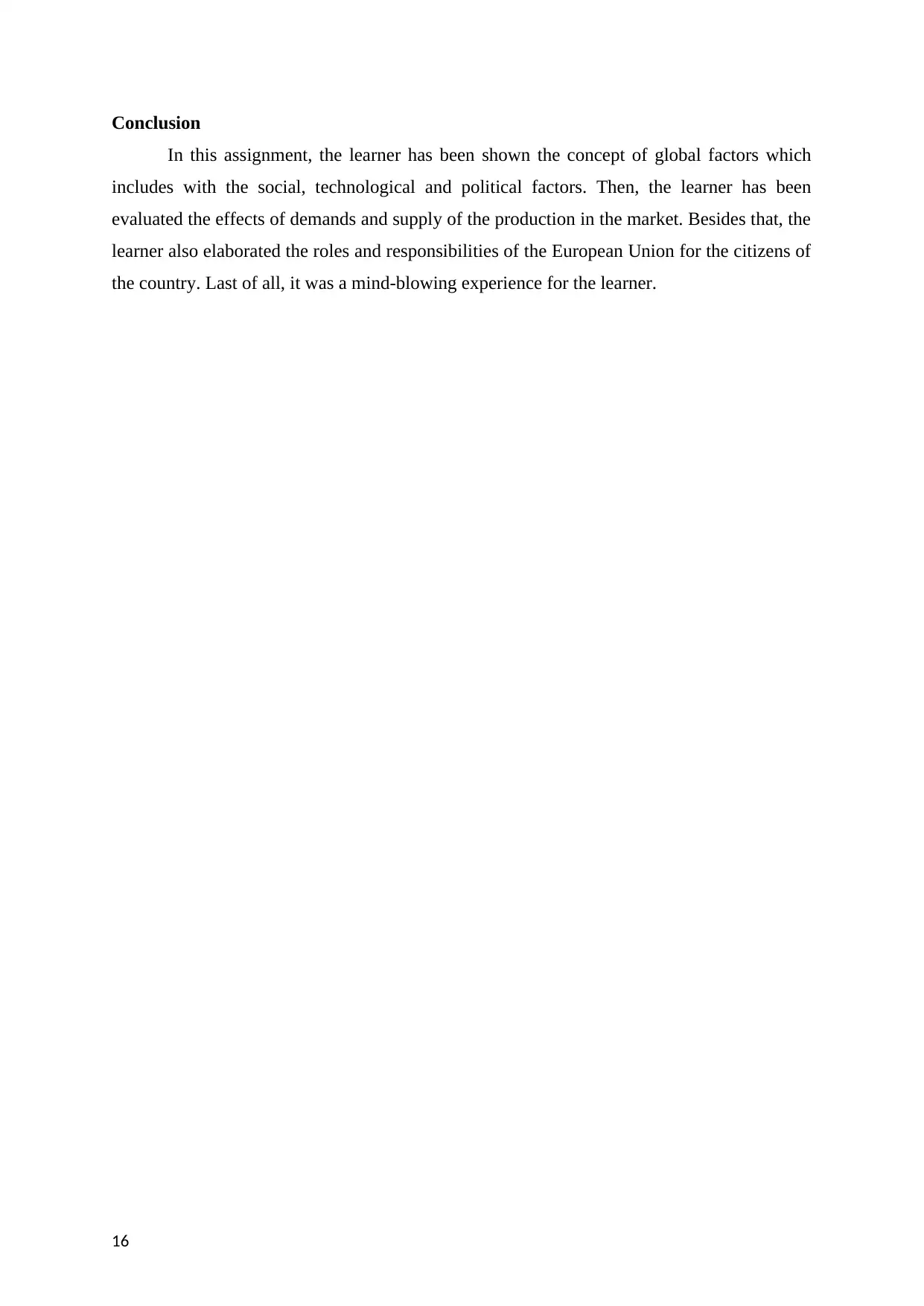
Conclusion
In this assignment, the learner has been shown the concept of global factors which
includes with the social, technological and political factors. Then, the learner has been
evaluated the effects of demands and supply of the production in the market. Besides that, the
learner also elaborated the roles and responsibilities of the European Union for the citizens of
the country. Last of all, it was a mind-blowing experience for the learner.
16
In this assignment, the learner has been shown the concept of global factors which
includes with the social, technological and political factors. Then, the learner has been
evaluated the effects of demands and supply of the production in the market. Besides that, the
learner also elaborated the roles and responsibilities of the European Union for the citizens of
the country. Last of all, it was a mind-blowing experience for the learner.
16
Secure Best Marks with AI Grader
Need help grading? Try our AI Grader for instant feedback on your assignments.
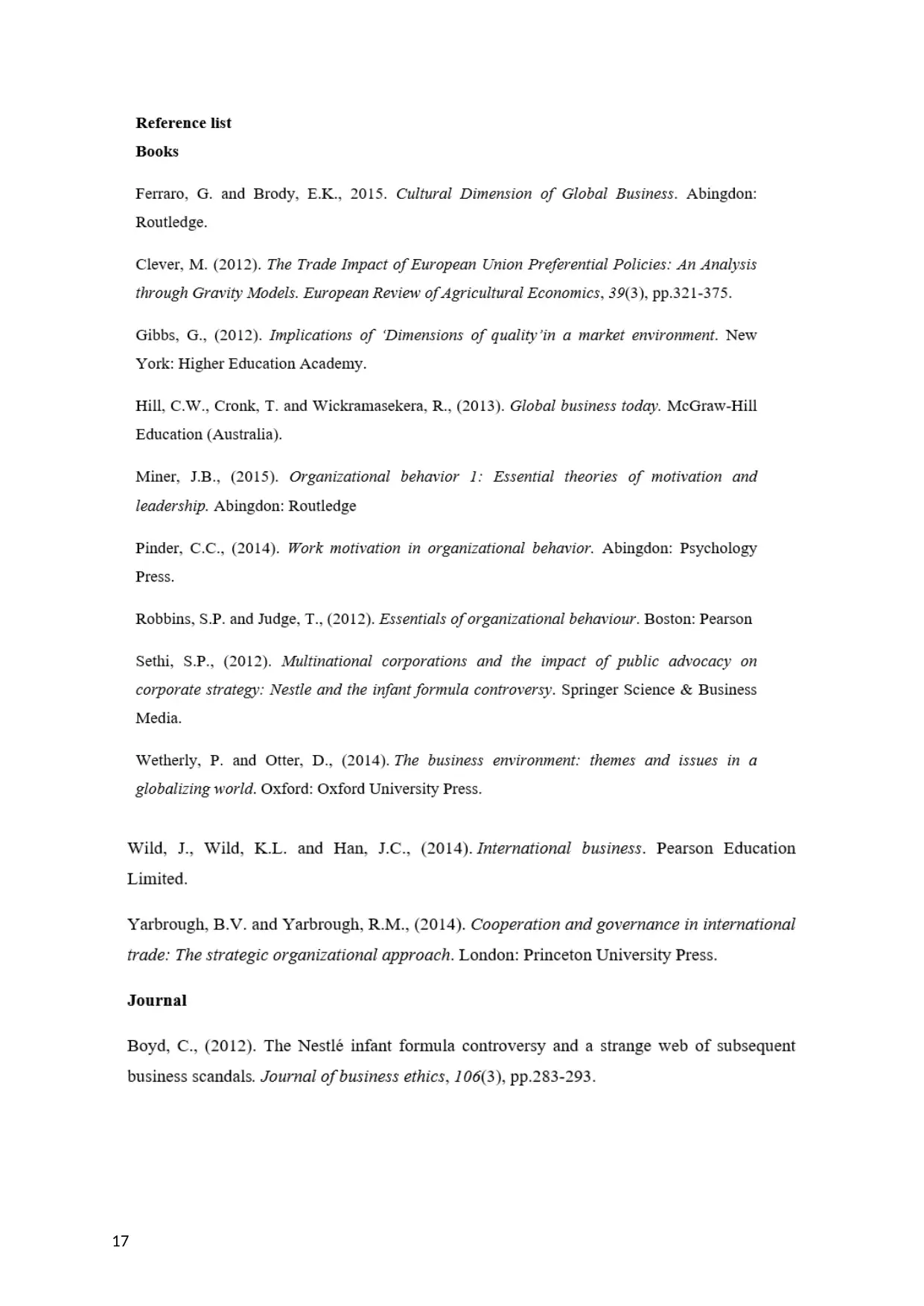
17
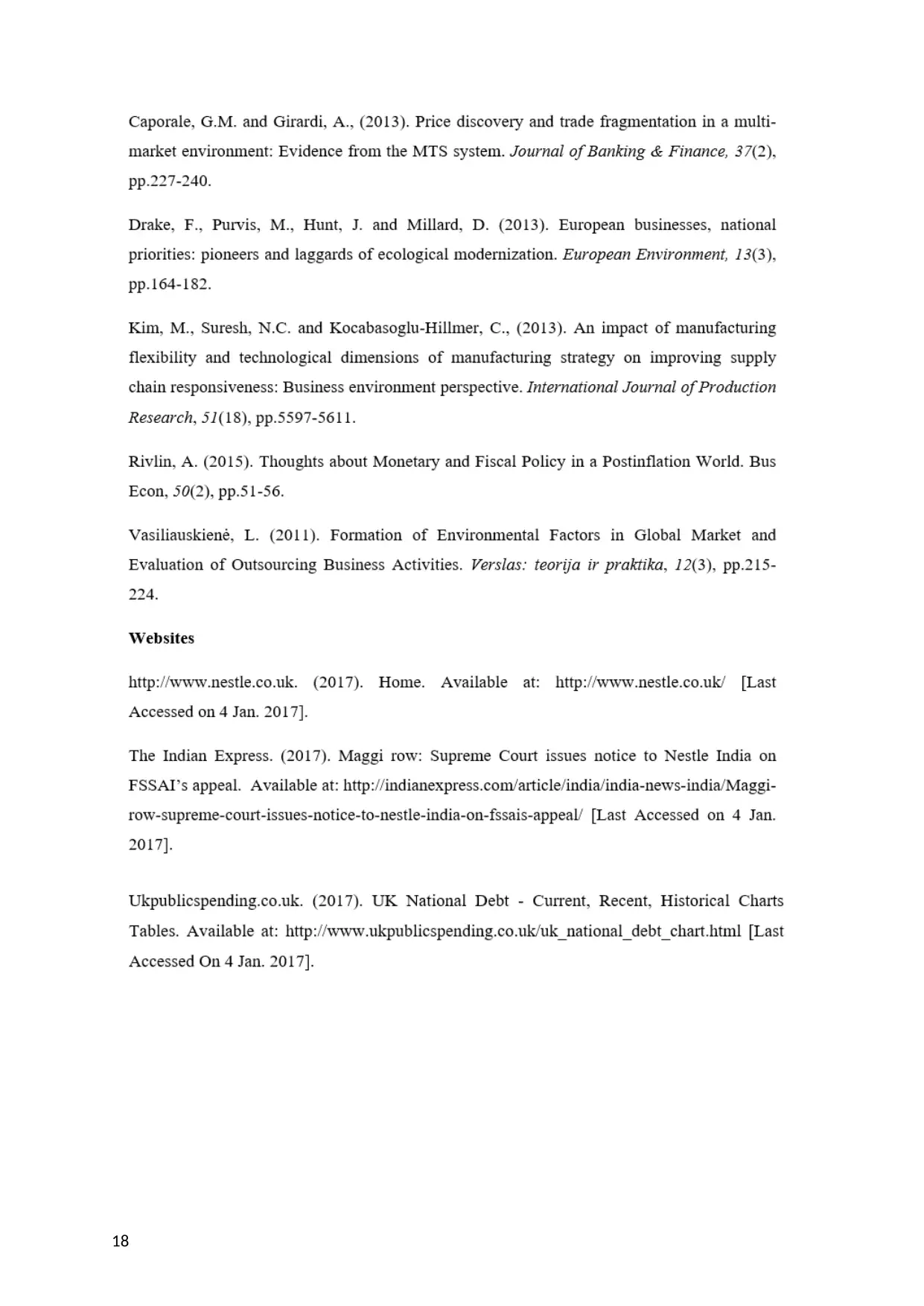
18
1 out of 18
Related Documents
Your All-in-One AI-Powered Toolkit for Academic Success.
+13062052269
info@desklib.com
Available 24*7 on WhatsApp / Email
![[object Object]](/_next/static/media/star-bottom.7253800d.svg)
Unlock your academic potential
© 2024 | Zucol Services PVT LTD | All rights reserved.





